






More than 80 surgical trainees complete RCSI’s intensive 40-hour Surgical Bootcamp training.
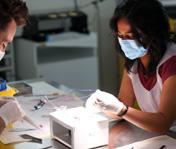
Her Excellency Ellen Johnson Sirleaf, Former President of Liberia and Africa’s first elected female head of state, receives the 2021 Emily Winifred Dickson Award.
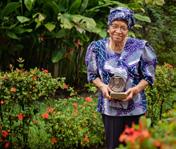
RCSI marks the launch of PPI Ignite, a national network to enhance public and patient involvement in research.

Professor Kevin Barry is appointed as Director of the National Surgical Training Programmes.
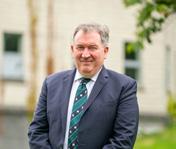
RCSI’s School of Pharmacy and Biomolecular Sciences and the Department of Physiology and Medical Physics receive Athena SWAN bronze awards for commitment to gender equality.
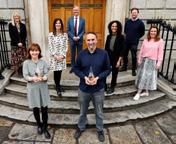
Cellist Patrick Dexter plays Silent Night on the RCSI steps for the Faculty of Nursing and Midwifery’s Virtual Christmas Gathering.

Students celebrate the RCSI White Coat Ceremony marking their new role as student health professionals.
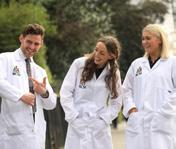
Vice Chancellor and Chief Executive Professor Cathal Kelly and President Professor P. Ronan O’Connell sign the contract for the €22 million Education and Research Centre at Connolly Hospital in Blanchardstown.
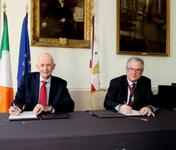
RCSI hosts the 8th annual Teddy Bear Hospital for more than 350 children and their teddies.
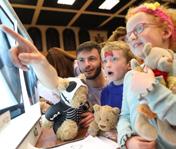
Ms Amina Mohammed delivers the 2022 Carmichael Lecture on ‘Transforming Education to Transform our World by 2030’.
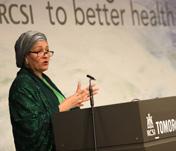
Final med student Luke Farrell celebrates with his father and Dublin Fire Brigade squad members at Results Day – the first live reading of the results since 2019.
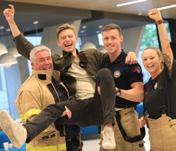
Colin Davidson wins the 2022 RCSI Art Award for his 3-D portrait of musician Glen Hansard.
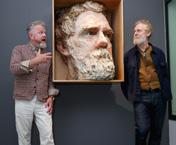
As we emerge from those most difficult times, I am very proud of the way that we in Ireland adjusted to the enormous challenges posed. Across the country, the healthcare community ensured continuity of urgent and time-critical care and selflessly gave of themselves in the care of others. RCSI played its role by supporting training, education and research, while always providing leadership and advice to the HSE and the wider community.
It is important to reflect on and acknowledge the extraordinary resilience and flexibility of RCSI staff, students and trainees, who rapidly adapted to restricted campus and clinical site access by introducing transformative formats in teaching and learning that in other circumstances would have taken years to develop. I have no doubt these new environments will enrich the experience of students and trainees who are fortunate to have access to
some of the world’s best simulation and online educational facilities in RCSI.
The pandemic exposed many of the infrastructural and staffing shortcomings of the health service, particularly the relative lack of ITU, HDU and isolation beds. The need to separate acute from scheduled care has never been more pressing as bed capacity is exceeded and waiting lists extended. Clinicians in every discipline are now seeing the consequences of deferred cancer screening, delayed diagnosis and late presentation.
The National Clinical Programme in Surgery (NCPS), under the leadership of Council Members Professor Deborah McNamara and Mr Kenneth Mealy, has worked tirelessly with the HSE on the design of programmes to provide better configuration of services for surgical care. In 2022, the NCPS produced three models of care in vascular surgery, plastic surgery and oral maxillofacial surgery. We must hope that long-heralded reconfiguration of surgical services will occur to allow separation of urgent from scheduled care, increased theatre access and protection of surgical beds.
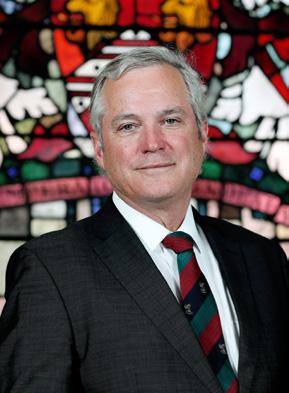
The biggest challenge to face the Department of Surgical Affairs in 2022 was to ensure a return to normal delivery of services and training. It is very reassuring that the numbers of applicants for Core Surgical Training continues to increase. Working with the HSE through the National Doctors’ Training and Planning (NDTP) Division, the intake into Core Surgical Training increased by one third to 80 per year. For 2022-2023 we expect to have 157 Core Surgical Trainees and 264 Specialty Trainees across surgical training programmes and 76 Core Trainees and 65 Specialty Trainees in the Emergency Medicine Programme.
In August 2021, the new Intercollegiate Curriculum in Surgical Training was introduced and thanks are due to the trainers and trainees in all specialties for their enthusiastic engagement.
As the national body responsible for surgical training, RCSI has worked tirelessly to ensure that progression through surgical training continued during the pandemic and that the necessary Membership and Fellowship examinations were reintroduced following a short suspension. This was facilitated by the moving of Part A of the Membership examination to an online invigilated model. This allowed delivery of the Part A examination in secure centres around the world, while the international Part B clinical examinations restarted in mid-2022. The Faculties of Dentistry, Radiologists, Nursing and Midwifery and Sports and Exercise Medicine also adopted online examination formats and have recently resumed their normal professional education and examination delivery.
It has been a great privilege to serve as President of RCSI through the past two years during which the COVID-19 pandemic has overshadowed healthcare, training, education and society.Professor P. Ronan O’Connell, President
This year the UEMS (European Union of Medicine Specialists) examination in General Surgery was held in Dublin for the first time, under the oversight of incoming RCSI Council Member Professor Paul Ridgway. RCSI hopes to build on the success of this venture and to develop closer collaboration with UEMS specialty bodies.
RCSI continues to work closely with colleagues in the specialty boards in Oman, Saudi Arabia, Qatar and Bahrain, and with consultants in Ireland, to provide training opportunities to facilitate senior international trainees to come to Ireland as fellows to learn new skills and develop their careers.
Council established three short life working groups to report on major issues concerning surgical practice and service delivery. The working groups reported in early 2022 and copies of the reports are available online at rcsi.com/surgery.
The short life working group on Career Development and Support Programme for Non-Training Scheme Doctors (NTSDs) under the chairmanship of Council Member Mr James Geraghty reported in April 2022. This is an important document that recognises the enormous contribution that NTSDs make to the delivery of surgical services in Ireland, how undervalued they feel and how little career guidance and oversight they are offered. The report has been provided to the Department of Health and NDTP and has been shared with the Forum of Postgraduate Medical Education Bodies. It is to be hoped that the recommendations made in the report will be actioned.
The short life working group on Best Practice in Cosmetic Surgery under the chairmanship of Council Member Ms Margaret O’Donnell reported in May 2022. The purpose of the report was to consider issues of patient safety and lack of regulation of cosmetic surgery that had been identified by the GMC in the UK and how these might relate to the practice of cosmetic surgery in Ireland. While RCSI is
not a regulatory body, the report identified similar issues in Ireland and recommended that a forum of those involved in cosmetic surgery be convened with the aim of improving safety for patients who seek cosmetic surgery.
The short life working group on Best Practice in Adrenal Surgery under the chairmanship of Council Member Professor Paul Redmond also reported in May 2022. The report highlighted the need for multidisciplinary care and minimally invasive surgery in dealing with the dramatic increase in volume of adrenal abnormalities identified on cross-sectional imaging. The report recommends creation of an Irish Adrenal Network to coordinate data collection, facilitate research and develop links with similar organisations abroad.
RCSI was established under Charter as an all-island institution. Since then our colleagues in Northern Ireland have continually made very valued contributions to the College through a range of engagements and are particularly active in the Court of Examiners and teaching in RCSI. This relationship has continued to blossom and this has been underlined by the increasing number of doctors based in Northern Ireland sitting the MRCS exam with RCSI.
Council is acutely aware of this really important relationship and established a new committee in 2020 to improve engagement with the 345 RCSI Fellows and Members who practice in Northern Ireland.
Under the chairmanship of Council Member Professor Thomas Lynch, the Committee has undertaken several initiatives to support trainees and surgeons in Northern Ireland. The Surgical Matters Webinar Series has increased awareness of the difficulties experienced by colleagues in Northern Ireland in delivering surgical care.
This very engaged committee reports through the Committee for Surgical Affairs within which Northern Ireland is a now standing agenda item. As RCSI President I advocated strongly for an intercollegiate approach in support of patients and the surgical community in Northern Ireland.
Through the Academy of Medical Royal Colleges, I was able to ensure that Northern Ireland is now represented at the Academy where previously there had been no regional representation.
The Council Research Committee, chaired by Professor Michael Kerin, appointed Professor Stewart Walsh as Director and Dr Anne-Marie Byrne as Programme Manager of the new National Surgical Research Support Centre, funded by RCSI, which began operation in January. The Centre is
It is very reassuring that the numbers of applicants for Core Surgical Training continues to increase.
building on the success of the Irish Surgical Research Collaborative to establish an all-Ireland support network for all those interested in participating in surgical research. This is an important development that will provide a framework for both trainees and early career consultants to pursue collaborative research interests.
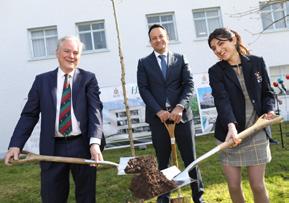
In 2021, Professor Kevin Barry was appointed Director of National Surgical Training Programmes. He takes over from Professor Oscar Traynor who has moved to his new role as Dean of Surgical Education after more than 20 years of service, which the College acknowledges with gratitude. Professor Barry brings great energy and insight to the role having previously served a Programme Training Director in General Surgery and an Intercollegiate examiner.
In a highly competitive field of applicants, Mr Michael Eamon Kelly was awarded the 2022 RCSI Colles Travelling Fellowship in Surgery. This most prestigious of the RCSI bursaries will support his specialty training in exenterative pelvic surgery in Melbourne, Australia.
Ms Christina Fleming was awarded the third PROGRESS Women in Surgery Fellowship funded by Olympus, that promotes female training at Fellowship level. Ms Fleming will now undertake a Fellowship in Robotic and Colorectal Surgery at Centre Hospitalier Universitaire, Bordeaux, France. Following her Fellowship, Ms Fleming will return to a Consultant General and Colorectal Surgery post within the University of Limerick Hospital Group.
In March, the RCSI Institute of Global Surgery hosted the inaugural Dublin Meeting in PatientCentred Global Surgery.
Thought leaders and experts from global surgery convened to share research, ideas and solutions to improve the safety, accessibility and affordability of surgery across the world. The event featured a series of discussions about innovative approaches to scaling up access to safe and affordable surgery, especially in low- and middle-income countries, with a focus on UN Sustainable Development Goal 3: Good Health and Well-being.
Building on the initiative of Past President Mr Kenneth Mealy, whose leadership during the first months of the pandemic was so important, and with the support of the Department of Surgical Affairs and the Fellows and Members office, RCSI developed a portfolio of digital communication with our Fellows, Members and trainees that initially provided vital information regarding the pandemic and then evolved into regular direct engagement. I am grateful to the many colleagues who have participated in these online sessions. One of the most gratifying comments I received as President was that this engagement made it feel that RCSI was "our College".
Yet again the pandemic made it impossible to attend the annual ACS (American College of Surgeons) Clinical Congress in-person. A virtual ‘Coffee and Connect’ webinar in lieu of the RCSI Reception for Fellows, Members, Alumni and friends was well-attended. Incoming ACS President, Dr Julie Freischlag, welcomed attendees; she was joined by RCSI Fellows Professors Conor Delaney, Hilary Sanfey, Noel Williams, John Monson and Dr Nicolas Mouawad in discussion with Council Members. Professor Ciaran O’Boyle, Director of the Centre for Positive Psychology and Health, gave an inspiring presentation.
Uncertainty due to the second and third waves of the pandemic led to deferral of the 2022 Charter Day meeting, originally scheduled for early February. We were however able to hold a very successful Millin meeting on Friday, 4 February at which Associate Professor Joseph Butler, Orthopaedic Surgeon at the Mater Misericordiae University Hospital, presented the 44th Millin Lecture on ‘The Evolution of Spine Surgery: A Paradigm Shift to Precision Medicine’. Professor Butler delivered an outstanding lecture covering his translational research from cellular biology to image-guided robotic-assisted surgery.
The Millin meeting was graced by the presence of UN Deputy Secretary General, Ms Amina J. Mohammed, who delivered the 29 th Carmichael Lecture on Transforming Education to Transform our World by 2030. Ms Mohammed was the first international lecturer to speak in-person in the College since the outbreak of the pandemic. Her lecture was truly inspirational. As President, I was delighted to be able to confer Ms Mohammed with Honorary Fellowship of RCSI.
The deferred Charter meeting took place on 21-23 April 2022 in a hybrid format. The theme was ‘The Career of a Surgeon’, a reflection on surgery as a career and life choice. Keynote speakers included Professor Melina R. Kibbe, Editor-in-Chief of JAMA Surgery, who delivered an address entitled ‘Publish or Perish: Impact, Equality, Access’; Dr Ozanan Ricardo Meireles, Director of the Surgical Artificial Intelligence and Innovation Laboratory (SAIIL) at Harvard University, who delivered the Johnson & Johnson Lecture titled ‘Artificial Intelligence: The Next Surgical Revolution’, and Professor John C. Alverdy who delivered the 97th Abraham Colles Lecture, ‘Examining the Root Causes of Surgical Complications through the Lens of the Microbiome’. Council member Mr Keith Synott chaired a multidisciplinary symposium on ‘Planning for a Mass Casualty Incident’ that highlighted the extensive background planning required and the lessons learnt from mass casualty events in other jurisdictions.
In addition to the award of Honorary Fellowship on Charter Day to Ms Amina J. Mohammed, Honorary RCSI Fellowships were awarded to Mr Roddy Doyle, the Irish novelist and screenwriter, and co-founder of Fighting Words; Professor Derek Alderson, Emeritus Professor of Surgery, University of Birmingham, Editor-in-Chief of BJS Open, Past President of the Royal College of Surgeons of England (RCSEng); Professor Trevor McGill, Department of Otolaryngology, Harvard Medical School, Boston Children’s Hospital; and Professor Stanley Goldberg, Clinical Professor of Surgery, University of Minnesota. It gave me great pleasure to award Honorary Fellowships to these individuals who have made significant contributions to the science and practice of surgery and to society as a whole.
As RCSI President I had the privilege of chairing the RCSI Medicine and Health Sciences Board, the body with responsibility for all academic and administrative affairs within RCSI University of Medicine and Health Sciences. Led by Chief Executive/ Registrar and Vice Chancellor Professor Cathal Kelly, supported by Deputy Vice Chancellor for Academic Affairs
Professor Hannah McGee and Deputy ViceChancellor for Research Professor Fergal O’Brien, the University proved to be vibrant and responsive to the
challenges of the pandemic, ambitious in progressing Project Connect, a €95 million expansion of the St Stephen’s Green campus, a €22 million education and research centre on the Connolly Hospital site, and progressive in the introduction of the new Transforming Healthcare Education Programme (THEP) that integrates the most modern pedagogy to the undergraduate and graduate entry medical curricula.
My sincere congratulations to the Senior Management Team and my thanks to Council and the academic and professional staff for what has been achieved in difficult times.
I wish to acknowledge the kindness and many courtesies I have received as RCSI President. I am grateful to the Fellows and Members of the College for their engagement and support. The Council has worked intensively to ensure good governance and financial probity of the College, postgraduate Faculties, the University and of our overseas campuses. I deeply appreciate the dedication and commitment of the Vice President, Professor Laura Viani, and Council members. I wish Professor Viani well in her role as President in the coming two years.
I would like to thank the Chief Executive/Registrar and Vice Chancellor, Professor Cathal Kelly, Deputy Vice Chancellor for Academic Affairs, Professor Hannah McGee and the members of the Senior Management Team for their hard work during a difficult year. I congratulate them on their success. Particular thanks also to Kieran Ryan and his colleagues in the Department of Surgical Affairs with who I had very close engagement.
I wish to acknowledge the contributions of the lay members of Council and the standing committees of the College. They bring a diverse wealth of experience that is of great value. I have enjoyed very cordial relations with the Presidents of our sister Surgical Royal Colleges and with the leaders of other medical training bodies in Ireland and the UK.
Finally, I would like to thank Kate Smith, Executive Assistant to the President, who retired on the same day I demitted office. Kate served with seven presidents since coming to RCSI with Professor Frank Keane in 2008. Kate, you embodied everything RCSI represents. Thank you and happy retirement.
Professor P. Ronan O’Connell President, RCSI; Emeritus Professor of Surgery, UCD

Professor Laura Viani Vice President, RCSI; Consultant Otolaryngologist/Neuro-otologist; Director of The National Hearing Implant and Research Centre, Beaumont Hospital/RCSI
Mr Kenneth Mealy
Immediate Past-President, RCSI; Consultant Surgeon (General), Wexford General Hospital
Professor Paul Burke Consultant Surgeon, Chief Academic Officer, University of Limerick Hospital Group

Professor Ronan Cahill Professor of Surgery, UCD; Consultant Surgeon (General/Colorectal), Mater Misericordiae University Hospital
Professor Camilla Carroll Consultant Surgeon (Otolaryngology/Head and Neck), RVEEH Dublin; Clinical Associate Professor, TCD School of Medicine
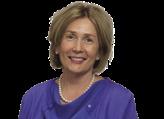
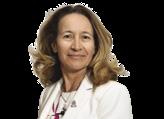
Professor Kevin Conlon Professor of Surgery, TCD; Consultant Surgeon (General/HPB), St Vincent’s University Hospital and Tallaght University Hospital
Professor K. Simon Cross Retired Consultant Surgeon (Vascular/ General), University Hospital Waterford


Ms Bridget Egan

Consultant Surgeon (Vascular), Tallaght University Hospital
Mr James Geraghty Consultant Surgeon (General/Breast), St Vincent’s University Hospital; Associate Professor in Surgery, UCD


Professor David Healy Associate Clinical Professor, Consultant Surgeon (Cardiothoracic/Transplant), St Vincent’s University Hospital and Mater Misericordiae University Hospital



Mr Paddy Kenny
Consultant Surgeon (Orthopaedic), Connolly Hospital Blanchardstown and The National Orthopaedic Hospital at Cappagh
Professor Michael J. Kerin Professor of Surgery, NUIG; Consultant Surgeon (Breast/Endocrine/ General), Galway University Hospital; Director, Cancer Managed Clinical Academic Network, Saolta

Professor Thomas H. Lynch Consultant Surgeon (Urology), St James’s Hospital






Mr Eamon Mackle
Consultant Surgeon (General), Craigavon Area Hospital
Professor Deborah McNamara Consultant Surgeon (General/Colorectal), Beaumont Hospital and Co-Lead National Clinical Programme in Surgery


Mr David Moore
Consultant Surgeon (Trauma and Orthopaedics), Children’s Health Ireland, Crumlin, Tallaght University Hospital and Blackrock Clinic
Ms Margaret O’Donnell
Consultant Surgeon (Plastic/Reconstructive/ Aesthetic), Blackrock Clinic and St Vincent’s Private Hospital; Group Clinical Director, Blackrock Healthcare Group
Mr David Quinlan
Consultant Surgeon (Urology), St Vincent’s Healthcare Group
Professor H. Paul Redmond Professor and Chairman of the Department of Surgery, UCC and Cork University Hospital Group
Chartered Accountant
Mr Keith Synnott Consultant Surgeon (Trauma/Orthopaedic), Mater Misericordiae University Hospital; National Clinical Lead for Trauma Services


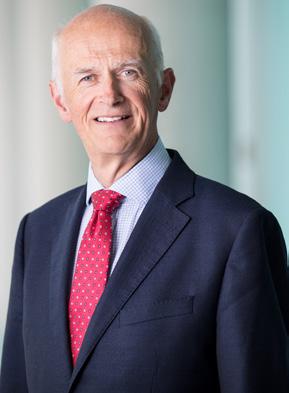
This report on activity from July 2021 to June 2022 provides me with a welcome opportunity to acknowledge the hard work and dedication of the staff and students of RCSI during the second year of the COVID-19 pandemic.
September saw a welcome return to on-campus activities for our students. While no one would deny the difficulties of delivering effective education in the previous academic year, there have been learnings and efficiencies which have transformed our work practices forever.
As COVID-19 measures were relaxed nationally, it was a pleasure to see students back on a vibrant, busy campus, socialising with their peers, taking part in University events, participating in clubs and societies, and experiencing the benefits of coming together in-person.
In May, we commenced construction at 118 St Stephen’s Green, the next phase of RCSI’s campus
development in Dublin city centre. The launch was attended by Minister for Further and Higher Education, Research, Innovation and Science, Mr Simon Harris TD.
The €95 million Project Connect, due for completion in 2025, will become the new ‘front door’ of the University and include a new civic space for public events and exhibitions.
The development will be home to the new RCSI School of Population Health, the RCSI Graduate School of Healthcare Management, and a 50 sqm virtual reality training space for the National Surgical Training Centre. It will enrich the student experience at RCSI with new small-group teaching spaces and provide vital infrastructure for pioneering health sciences research and innovation, as well as creating a space for local community engagement.
An important design feature of the new development is its physical link to 26 York Street, which opens up RCSI’s education space for the 3,000 students and staff who visit the campus each day.
In March, we were joined by Tánaiste and Minister for Enterprise, Trade and Employment, Leo Varadkar TD, as we turned the sod on a new €22 million Education and Research Centre at Connolly Hospital in Blanchardstown.
Due for completion in February 2024, the new centre will join the Smurfit Building, Education and Research Centre at Beaumont Hospital as RCSI's second clinical centre of academic excellence in Ireland.
The University is committed to the UN Sustainable Development Goals (UNSDG) and proud to rank top 50 in the world in Times Higher Education (THE) Impact Rankings 2022 published in April for its contribution to the UNSDG 3 'Good Health and Well-being'.
At the Millin meeting in April, RCSI President Professor P. Ronan O’Connell conferred Ms Amina J. Mohammed, Deputy Secretary General of the United Nations and Chair of the UN Sustainable Development Group, with an Honorary Fellowship. Ms Mohammad delivered an outstanding Carmichael Lecture: ‘Transforming Education to Transform the World by 2030’.
In February, RCSI became the first institution in the Republic of Ireland to be awarded Beacon Status in Sustainable Healthcare. Achieving this reflects RCSI’s commitment to integrating a more environmentally, socially and financially sustainable approach to healthcare education.
The University has completed the planning phase of the Transforming Healthcare Education Programme (THEP) and the new medicine curriculum will commence in September 2022.
The new programme has been designed through great collaboration between colleagues across the university with insights gained from international visits to the best medical schools in the US and Europe.
The programme focuses on teaching excellent clinical and communications skills, with a strong emphasis on population health and epidemiology including teaching on health care systems. It also emphasises the central tenets of Personal and Professional Identity formation: professionalism, resilience and leadership. This will equip our graduates for a personally and professionally challenging career in an increasingly global, digital and climate-focused world.
The School of Pharmacy and Biomolecular Sciences commenced its new MSc in Technologies and Analytics in Precision Medicine in September, filling an essential and emerging skills gap in the life sciences sector in the area of future transformative therapeutic technologies. The School’s new BSc in Advanced Therapeutic Technologies will commence in September 2022.
We established a new Centre for Professionalism in Medicine and Health Sciences to support the education, research and advocacy activities of Professor Denis Harkin’s Chair of Medical Professionalism, sponsored by the Bon Secours Healthcare Group. Professionalism is at the core of
the doctor-patient relationship. It is fundamental to patient safety and the delivery of high quality patient care. This new Centre reflects the University’s commitment to advancing the medical profession for the benefit of patients.
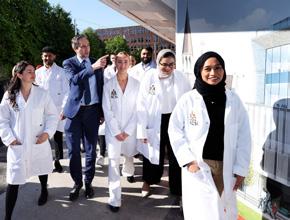
This year, we also established a new School of Population Health with Professor Edward Gregg as Head of School. Together with a multi-disciplinary team of committed researchers and advocates, Professor Gregg will be at the forefront of RCSI’s commitment to delivering educational programmes and driving research which improves the health of human populations across the world. The School’s first educational focus will be on a series of postgraduate taught programmes aimed at upskilling the public health workforce.
In February, we launched RCSI Online, a new digital platform providing online learning for healthcare professionals. Aimed at healthcare professionals who want to improve patient care and advance their careers while also balancing professional and personal schedules, the RCSI Online programmes are available to students anywhere in the world in an accessible and flexible format.
In November, The Sunday Times Good University Guide 2022 named RCSI as University of the Year for Student Engagement. The inaugural award was made in recognition of the University’s efforts to negate the impact of the pandemic on students through initiatives such as the deploying of simulation facilities to mimic clinical settings, the establishment of a satellite campus at Croke Park, and the setting up of small-group learning ‘bubbles’.
Our priority throughout the pandemic has been to protect patients and frontline healthcare staff on all our clinical sites and to ensure that the education and training of the next generation of healthcare workers was not disrupted. Our ethos is to put the wellbeing of our health sciences students at the centre of everything we do and we are very proud of the recognition shown by this award.
The University’s research activity continues to grow with newly-funded programmes, collaborations with clinical and industrial partners, and formation of new spin-out companies all working towards scientific breakthroughs to improve patient health.
In 2021, researchers at the University across a broad range of health science disciplines published 1,739 PubMed indexed articles and secured research funding of €37.5 million.
A significant strategic achievement was the accreditation of the Beaumont RCSI Cancer Centre by the Organisation of European Cancer Institutes (OECI) which sets comprehensive standards for cancer centres in Europe. A collaboration between RCSI, Beaumont Hospital and St Luke’s Radiation Oncology Network, the establishment of the Centre formalises the alliance and commitment to cancer care that has long existed between the three partners. The Centre, independently evaluated by a team of experts, was praised as “a patient-centred organisation with well-coordinated research structures and a dynamic education system”.
RCSI has approved the formation of four new spin-out companies. Inthelia Therapeutics is developing novel treatments for sepsis; Vertigenius is focused on a digital health solution for patients with balance disorders; PrOBMet is developing targeted treatments for breast cancer brain metastatic patients; and Phyxiom is a health analytics platform to help patients with uncontrolled asthma and other chronic respiratory diseases.
The value of research commercialisation funding at the University reached €2.4 million, a testament to RCSI’s world-class research expertise and focus on commercial application.
Through RCSI Engage, staff and students of the University worked on local community access and engagement programmes to make a sustainable impact on education and health for all. Initiatives included delivering festive gifts to older people in the area at Christmas, a physical activity programme with local primary schoolchildren, and working with local DEIS (Delivering Equality of Opportunity in Schools) schools to inspire curiosity and confidence in science. The University is also engaged with programmes to promote equality of access to education.
Further afield, University staff were involved in projects on safe water in India and on household air pollution in Malawi.
Throughout the year a team from RCSI provided mentorship to the teams competing in the Global Surgical Training Challenge. This $5 million competition aims to stimulate the creation of novel, low-cost surgical training modules that will help surgical practitioners to learn new skills to improve the health of their communities.
In early 2022 a new international research project to drive evidence-based policy and advocacy for Medical Licentiate practitioners in Zambia was announced by the RCSI Institute of Global Surgery, Heidelberg Institute for Global Health, SolidarMed and the Surgical Society of Zambia.
RCSI University of Medicine and Health Sciences has been ranked among the top 250 universities worldwide for the sixth consecutive year. The University’s particularly strong performance in the research metrics is evidence of continued emphasis on the patient-focused research of our academics, clinicians and educators, and of our growing reputation for impact in the field of human health.
In November, RCSI became the first university in Ireland to publish an action plan aimed at advancing race equality and tackling racism. As one of the country's most internationally diverse universities, RCSI's Race Equality Action Plan reinforces its commitment to ensuring that the experience of its students, trainees and staff is defined by respect, equality and inclusion.
Developed by RCSI students and staff, with external advice, the plan identifies a comprehensive list of actions that are being implemented, and involves listening to and learning from the lived experiences of students and staff.
As Vice Chancellor and CEO of RCSI, I could not be more proud of the commitment of our staff and students, and acknowledge the contribution of the patients, clinicians and staff of our teaching hospitals during what has been another challenging year.
I am particularly grateful for the positive attitude and strong collegiate spirit demonstrated by everyone in the RCSI community. Your outstanding contributions have ensured that we have continued to deliver on our mission, as we navigate our way out of the pandemic.
I extend my sincere thanks to Professor P. Ronan O’Connell for the leadership he demonstrated during his tenure as RCSI President. I also extend my gratitude to my colleagues on the Senior Management Team, and the RCSI Council, for their guidance and collegial support.
RCSI became the first institution in the Republic of Ireland to be awarded Beacon Status in Sustainable Healthcare
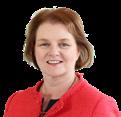










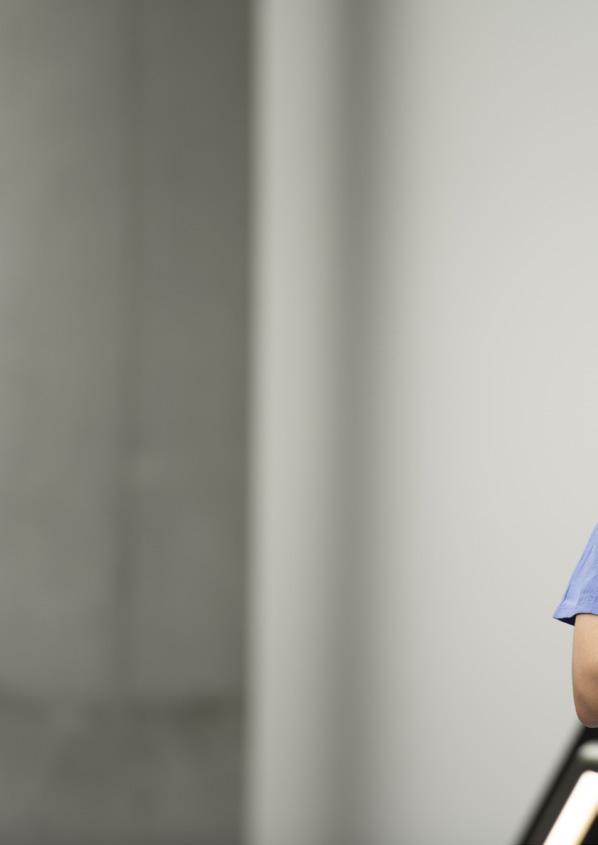
facilities at RCSI have given me the opportunity to practice surgical skills in a safe environment before my hospital rotations.
DrIshaBagwe,
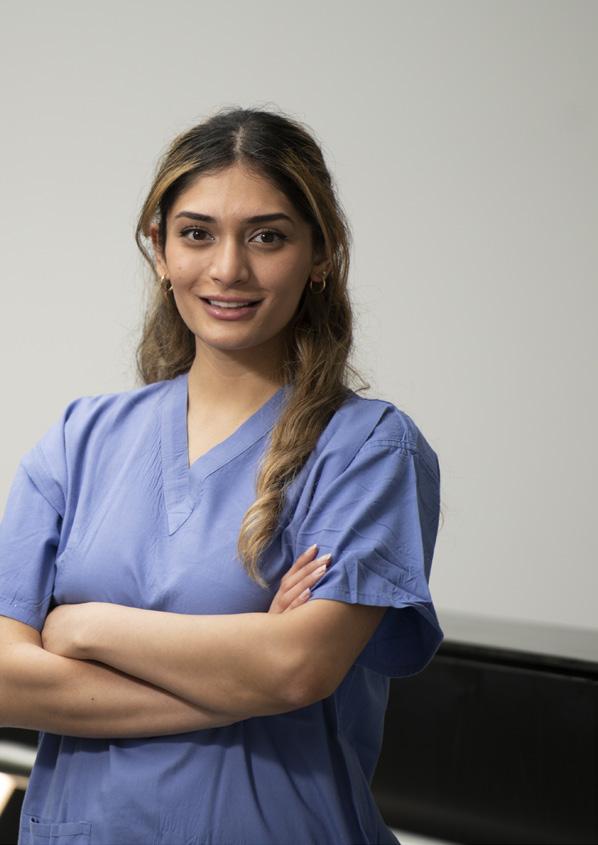

As we began to emerge from the pandemic, the biggest challenge for Surgical Affairs was ensuring the return to normal of the delivery of services and training. Gradually, we were able to increase face-to-face contact, both within the Surgical Affairs team and with our students and trainees.
As we re-established the classes, courses and exams that had been disrupted, our focus was on what our new operational model would look like. Given we were still working under some restrictions, and the likelihood of spikes and waves, we had to find a way to continue to work and make progress. We concentrated on the delivery of core programmes for trainees and students.
Professor Kevin Barry took up the role of Director of National Surgical Training Programmes. Professor Barry is a General Surgeon based in Castlebar and Galway and an FRCS examiner who has previously been the Training Programme Director for General Surgery. He brings great energy, pragmatism and innovation to our training programmes.
Professor Oscar Traynor moved to his new role as Dean of Surgical Education. On behalf of the department, I’d like to acknowledge Professor
Traynor’s contribution to Irish surgical training over more than 20 years and also to congratulate him on receiving an Honorary Fellowship from the American College of Surgeons.
COVID-19 continued to have a big impact on the delivery of surgical care. With fewer operations taking place, there were fewer opportunities for trainees to obtain the experience they needed. However, while there was a slight drop in the numbers of cases in logbooks, trainees were able to meet their indicative numbers and did not experience delays to their training. This was thanks to the prioritisation of those at the beginning and end of their training, and the willingness to adapt on the part of both trainers and trainees. Thankfully, the cyber attack on the HSE did not impact directly on training, and we found ways of working around any peripheral issues that arose with careful management and monitoring.
Under the leadership of Professor Kevin Barry and Professor Oscar Traynor we were delighted to increase our intake into Core Surgical Training to 80. We are grateful to the hospitals who facilitated the introduction of an increased number of training places. For 2022/2023, we expect to have 157 Core Surgical Trainees and 264 Specialist Trainees across our surgical training programmes. Thanks to Dr Gareth Quinn, Dean of Emergency Medicine Training, and all the trainers involved, we enrolled significant numbers in our Emergency Medicine Programme, with 76 Core Trainees and 65 Specialty Trainees for 2022/2023.
We continued to focus on equality, diversity and inclusivity across our programmes. We record and publish information related to gender, age and nationality. In 2022, we had 286 applications for CST, 61% were male and 39% female, we appointed 81* candidates to our programme, 60% male and 40% female, and 67 EU/Irish and 14 non-EU.
Our in-person Surgical Bootcamp 2022 began in June and will continue into July.
The main focus of the new curriculum is a fresh approach to multi-consultant reports for trainees, trainee progression, and the introduction of competencies in professional practice.
In August 2021, we rolled out the new Intercollegiate Curriculum in Surgical Training. This involved raising awareness, education, and system-testing new ways of capturing trainees’ progression. The main focus of the new curriculum is a fresh approach to multi-consultant reports for trainees, and trainee progression, and the introduction of competencies in professional practice. These are specific competencies around organisational, administrative and communications skills, which are important for anyone wishing to progress to become a senior consultant. There has been good early adoption of the curriculum with engagement by trainers and trainees in all specialties.
We continued to develop the Faculty of Surgical Trainers as the vehicle to support trainers in meeting the requirements of the Medical Council in relation to their continuous development as trainers and their accreditation.
We also continued to work closely with the Irish Surgical Trainees Group, chaired this year by Mr Michael Flanagan. I would like to thank him and his committee for their ongoing engagement with Surgical Affairs.
Ms Christina Fleming was the third recipient of the important PROGRESS Women in Surgery Fellowship, and we are very grateful to Olympus for their support. Christina is undertaking an international fellowship in robotic colorectal surgery and
advanced pelvic malignancy in the Pelvicare Centre, Centre Hospitalier Universitaire, Bordeaux, France.
Under Professor Sean Tierney, Dean of Professional Practice and Development, the College’s Professional Competence Scheme continues to support surgeons in their work.
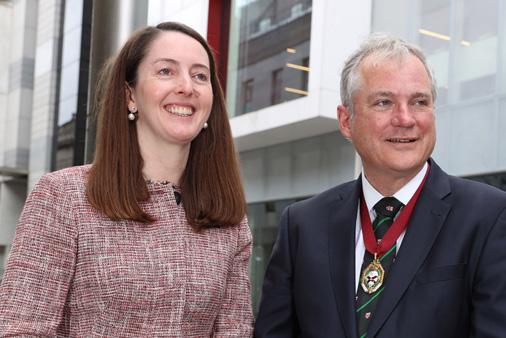
Council established three short-life working groups to report on specific areas of clinical practice. These significant reports were chaired by members of Council engaging with relevant specialties and are invaluable in helping guide the College in dealing with these areas.
Professor Paul Redmond chaired the Clinical Report on Adrenal Surgery, looking at the best ways of configuring and delivering adrenal surgery services in our hospital system, and giving recommendations to help guide colleagues in delivering the best standard of adrenal surgical care.
Ms Margaret O’Donnell chaired the Report on Cosmetic Surgery in response to ongoing concerns that patients need to be informed and made aware of the type of care and procedures being offered in this field. The report is very helpful in terms of mapping out the issues around the definition of cosmetic surgery, and the qualifications needed to deliver safe cosmetic surgical care. It provides recommendations as to how the College should engage with
advertising authorities, the Medical Council, the HSE and HIQA in the regulation of standards in the interest of patient safety.
Professor James Geraghty chaired the Report on Career Support for non-training non-consultant hospital doctors (NCHD). The College wishes to provide education and career support to colleagues who work in surgical posts in Ireland but are not on the national structured training programme. The recommendations in the report will guide the ongoing work of Surgical Affairs as it liaises with the HSE in its role as employer on CPD and training courses. A logbook is now available to everyone in a surgical post so they can record their experience, develop their portfolio, and put structure on the development of their career.
In collaboration with the HSE, we continued to work on the design of national surgical programmes to provide the best configuration of services for surgical care in terms of what procedures should be done where and by whom.
The National Clinical Programmes (NCPs) produced three models of care in vascular surgery, plastic surgery and oral maxillofacial surgery. Under their respective national leads, all clinical programmes continued to engage with the HSE in helping to measure efficiencies we can build into the system and maximise the amount of care we can provide to patients.
Professor Stewart Walsh was appointed to lead the newly-established National Surgical Research Support Centre (NSRSC), with Dr Anne-Marie Byrne as Programme Manager. The College has committed €1.2 million in funding over three years to help build
I am a general and colorectal surgeon, awarded FRCSI in 2020 and CCST in 2021. I have a strong interest in academia, with more than 80 papers published and 30 prizes, bursaries and research grants for my work. I also hold a basic science PhD and qualifications in human factors and clinical leadership and I am past Chair of the Irish Surgical Research Collaborative
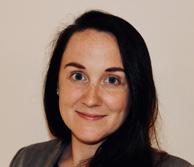
It was a huge honour to receive the 2022 PROGRESS Women in Surgery Fellowship.
The award has enabled me to undertake a Fellowship in Robotic and Colorectal Surgery at Centre Hospitalier Universitaire, Bordeaux, France. The Fellowship focuses on a broad range of advanced colorectal surgery practice including robotic and transanal surgery.
During the Fellowship, I aim to develop key skills required to deliver a high-quality colorectal surgery practice for Irish patients and integrate innovative surgical techniques including robotic and transanal surgery.
I am delighted that the PROGRESS Fellowship will also offer me an important opportunity to continue the conversation of increasing and supporting female participation and success in surgery.
Following the Fellowship, I will return to a Consultant General and Colorectal Surgery post at the University of Limerick Hospital Group and look forward to implementing these advanced new skills in my role.
Olympus funded the fellowship through an educational grant and is not involved in the selection of candidates for the fellowship.
In collaboration with the HSE, we continued to work on the design of national surgical programmes to provide the best configuration of services for surgical care.
Ms Christina Fleming PhD FRCSI PROGRESS Women in Surgery Fellowship recipient
a national network of surgical clinical trials. The aim is to establish the network, show capability, and then approach the Health Research Board (HRB) for funding to help sustain the network on an ongoing basis. We have had an enthusiastic response from trainees who see this as a very useful resource to help support them in multi-centre clinical trials and also to assist them in engaging in academic research and in the development of publications. The Retainer Study is the first study to receive support from the NSRSC.
The NSRSC will provide assistance with applications to hospital Research Ethics Committees (RECs), grant-funding agencies and work to improve
networking in the various specialties in different hospitals. It will help design the study, obtain the approval necessary for clinical trials, and look at ongoing monitoring of studies in terms of patient recruitment, quality of data, and data analysis. It will also assist research teams to publish their results and disseminate information relating to progress in surgical care. This is a big strategic initiative for the College and we look forward to its ongoing success.
The European Union of Medical Specialists (UEMS) exam was delivered in Dublin. The exam was chaired by Professor Paul Ridgway and I would like to thank Paula Mansell and Dr Marie Morris for ensuring its efficient delivery. It is good to see a European exam delivered in Dublin and we are using this new initiative to develop our relationships and collaboration with the specialty bodies in the EU and associated countries, and to understand more about European developments in specialty training.
As part of the ongoing development of relationships with our international partners, especially in the Middle East, we worked closely with our colleagues on the specialty boards in Oman, Saudi Arabia, Qatar and Bahrain and consultants in Ireland in hospitals where they may have opportunities for training for senior fellows. Senior international trainees can come to Ireland to learn skills and develop their careers, while Irish surgical units benefit from high quality international trainees for defined short periods of time. The fellows enhance our departments by bringing their experience with them and are very focused on driving their careers. In the past year we have offered 17 posts to senior international fellows, all accredited by RCSI in accordance with our standards for fellowship recognition. The process ensures the individual arrives with a clear learning aim and that there is a structure to record the learning outcome activities and for the College to validate that they have achieved the desired outcomes from the fellowship. On completion, we provide them with a Certificate of Completion of Fellowship Training. The programme develops ongoing relationships internationally and enhances the great reputation of Ireland as a world leader in surgical care. We look forward to its continued success.
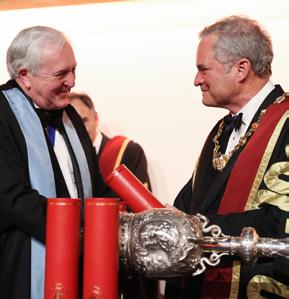
The big change this year was in relation to Part A of the Membership examination where the Intercollegiate Board worked hard to help us to move to an online but invigilated model. The integrity of the exam is vitally important, and the College has now signed a contract with international organisation Pearson VUE for the
Irish surgical units benefit from high quality international trainees for defined short periods of time.Professor Derek Alderson, Emeritus Professor of Surgery at the University of Birmingham and immediate Past-President of the Royal College of Surgeons of England, receives an Honorary Fellow from President Professor P. Ronan O'Connell, at the first in-person Charter Day celebrations for more than two years.
delivery of computer based exams in secure centres around the world in up to 43 locations. We owe thanks to Emma Scally and her team for making this happen.
Although we were able to deliver clinical exams in Ireland and the UK throughout the pandemic, the delivery of international exams was affected. There are no trainees in Ireland or the UK who will not progress because they have not been able to sit their Part B, but there is still a significant waiting list of international candidates. As travel restrictions abated, we were able to run our first Part B in-person clinical exam in Dubai in May 2022 and are resuming exams in the Middle East and Malaysia in the coming months.
All other programmes have progressed well. Surgical Affairs is involved in developing RCSI’s academic and educational programmes, including our postgraduate degree offering to medical as well as surgical NCHDs. Last year we launched our MSc in Advanced Clinical Practice for medical NCHDs, alongside our Masters in Surgery for surgical NCHDs. The two are equivalent in terms of academic reward and we have seen significant enrollment in both, as well as in our MSc/Postgraduate Diploma in Human Factors in Patient Safety. Our thanks to all the members of the faculty and the administrative team involved.
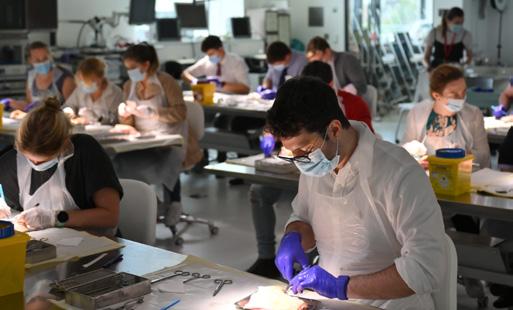
We have also worked on the ongoing expansion of our CPD programmes supported by the HSE to ensure the NCHDs they employ have ongoing
education and training to meet requirements of professional competence. We now offer 114 courses each year, about half of which are classroom-based, with the other half delivered online with interactive course material.
Under the leadership of Mr Dara Kavanagh, the department has been active in research, producing 31 peer-reviewed publications, and supervising two PhDs and two MDs.
As always, I need to acknowledge the work, professionalism and dedication of the Surgical Affairs team. Our trainees, students, trainers, Fellows and Members are fortunate to have such a diligent team to look after their professional, educational and training needs. I also want to thank all of our Fellows, Members, trainees and associate colleagues who engage with RCSI in the delivery of our teaching, training, assessments and examinations. I want to thank the Council of RCSI for their ongoing support of the activities of Surgical Affairs and my colleagues on the Senior Management Team and across RCSI. We have a great community in RCSI and long may that continue.
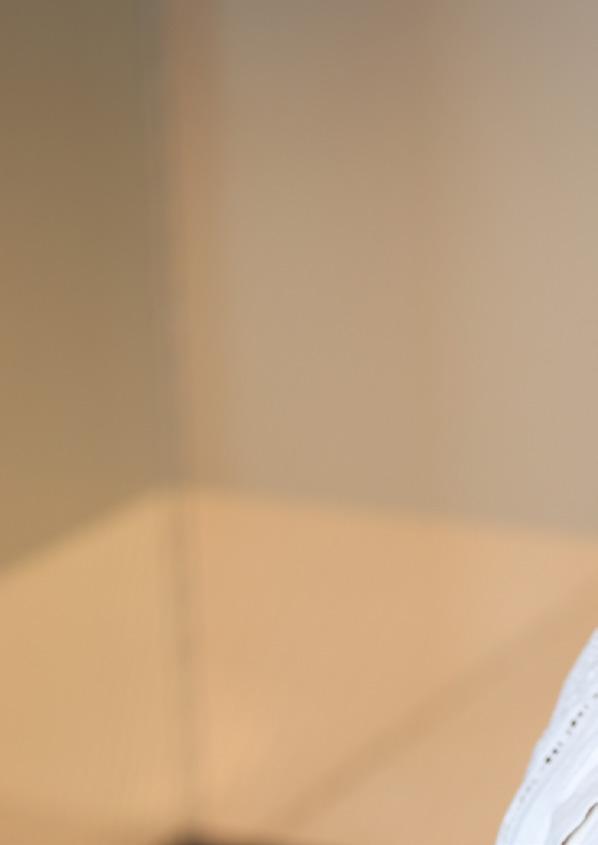
The concept of adding not just years to our life, but life to our years, struck a chord with me; by viewing lifestyle as medicine, we become mindful of daily choices.
AnnaWalsh,
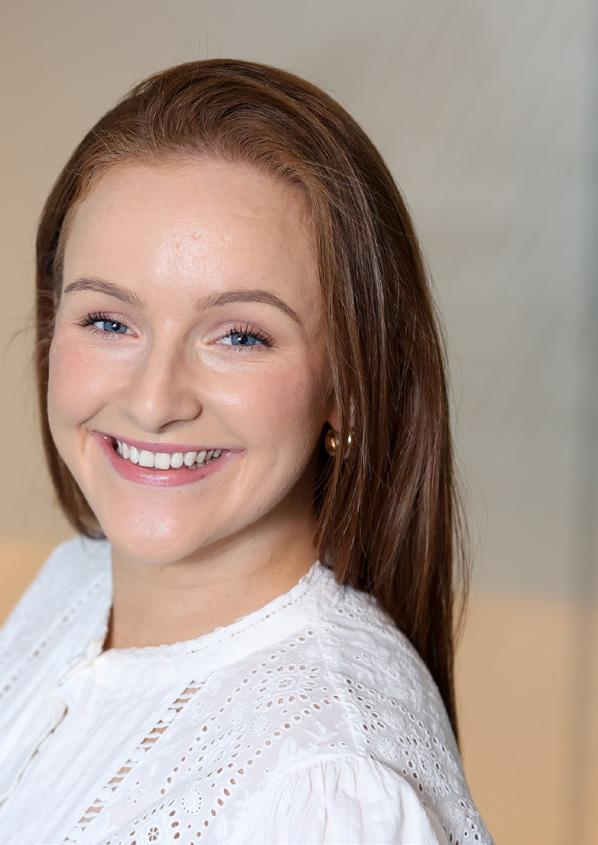

Our strategy at RCSI University of Medicine and Health Sciences is to transform healthcare education by focusing not just on the quality of the education we deliver but also on the nurturing of young healthcare professionals at the start of their careers, as they begin to develop their personal and professional identity.
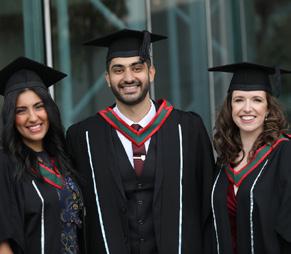
In support of this strategy, 40 members of faculty participated in the University of Pennsylvania’s Resilience Programme and are using programme skills to help students develop the ability to selfreflect on their individual strengths and weaknesses in parallel with their academic studies.
Having completed this faculty training and other implementation components of the Transforming Healthcare Education Programme (THEP), the new core curriculum will commence in September. We look forward to the next academic year being fully inperson as we returned to entirely in-person teaching in January, while retaining online availability of all lectures. We are piloting new digital technologies to administer grades, placements and feedback, and we
also expect to proceed to full roll-out next year.
We launched a Certificate in Lifestyle Medicine this year, an optional additional course open to all students in medicine, graduate entry medicine and physiotherapy. Led by Professor Anne Hickey, Professor of Psychology and Deputy Dean for Positive Education, the Certificate focuses on the six pillars of a healthy lifestyle and aims to provide evidence-based knowledge and practical strategies for the participants and their future patients. We will award 127 certificates to this first cohort.
We also established a new Centre for Professionalism in Medicine and Health Sciences to support the growing education, research and advocacy activities of Professor Denis Harkin’s Chair of Medical Professionalism, sponsored by the Bon Secours Healthcare Group.
Pursuant to funding awarded by the Higher Education Authority, the School of Pharmacy and Biomolecular Sciences (PBS) has launched a new BSc in Advanced Therapeutic Technologies with the first intake of students in September. Professor Tracy Robson, Professor Brian Kirby, Dr Ben Ryan, (Programme Director), and Professor Judith Harmey, (Deputy Programme Director), have developed this programme with the changing needs of the biopharmaceutical sector in mind. The BSc incorporates healthcare innovations and technologies in areas such as genomics, precision medicines, big data and connected health, and will equip students with extensive future-focused scientific knowledge and technical skills to address current and future healthcare needs.
This year we also established a new School of Population Health with Professor Edward Gregg as Head of School. This combines the Departments of Health Psychology and Epidemiology & Public
Health, the Data Science Centre, the Health Outcomes Research Centre, and the Institute for Global Surgery under one banner. Its first educational focus will be on a series of postgraduate taught programmes aimed at upskilling the public health workforce.
A new ‘RCSI Educate’ campaign was introduced to highlight excellence in our educational activities, to peer audiences, primarily through social media. Internally, the Education Innovation Award recognises the importance of innovation in teaching and learning, and highlights examples of innovative educational practice in medicine and health sciences education. The 2021 winner was Dr Shona Pfeiffer for her presentation ‘The art of auscultation – a digitally enhanced learning resource’. The 2022 International Education Forum focused on faculty development and innovation and helped to combine the efforts of Dublin and Bahrain to ensure we are moving at the same pace with shared purpose around the new curriculum. The Forum was wholly online, facilitating
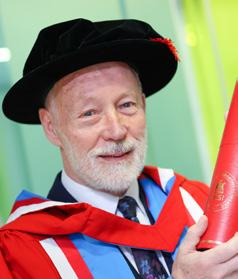
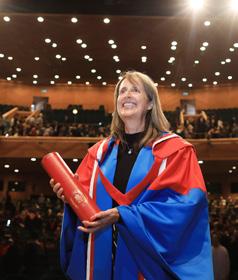
personnel in both locations to join in all discussions. The Forum is an annual milestone in furthering commonality and is extremely helpful in terms of sharing ideas and exploring potential synergies.
We are very proud that the University was named The Sunday Times University of the Year for Student Engagement, recognising the efforts made by the University to mitigate the impact of the pandemic on students. From establishing our satellite campus at Croke Park to deploying our simulation facilities to mimic clinical settings, to amending the exam schedule, our priority throughout the pandemic has been to get our students one year closer to graduation while protecting their health and wellbeing. Our StEP (Student Engagement and Partnership) initiative, under the leadership of Professor Celine Marmion, saw 15 staff/student teams work collaboratively on projects designed to enhance the overall student experience in spring, with similar numbers expected in summer.
A welcome return to in-person learning was concurrent with the final year of preparation for the implementation of the new medical curriculum.
The return of in-person teaching

Faculty and students were pleased to transition back to in-person learning. We retained the best of the new technologies embraced during the COVID-19 pandemic, so all teaching is recorded and available to a wider group.
The School has spent the last eight years developing a new medical curriculum - the Transforming Healthcare Education Programme (THEP) - to commence in September 2022. This final year of preparation has been driven by a very strong team working closely with our colleagues in Bahrain on numerous pilots and on training for faculty, pursuant to an extensive change management programme within the University.
THEP is a completely new curriculum, designed in collaboration with specialist experts in medical education with insights gained from international visits to the best medical schools in the US, Europe and the UK.
There are six key elements to THEP, which we believe to be the very best curriculum to lead us forward.
Firstly, it is student-centred. We have rationalised the content to ensure that there is no volume-overload and that it is stage-appropriate.
Secondly, assessment is programmatic. Instead of a major exam at the end of the year, there will be multiple smaller assessments during the year.
Thirdly, three separate pillars form the scaffolding of THEP: knowledge, clinical skills, and Personal and Professional Identity (PPId). We believe PPId is very important for the education of a doctor, as it trains students in how they should conduct themselves and behave as medical practitioners. It also focuses on their professionalism and enhances their understanding of leadership and resilience.
Fourthly, sophisticated technology facilitates delivery of the programme. The first principal software we will be using is Kaizen, providing a personalised dashboard for each individual student so they will know where they stand in relation to their knowledge, skills and professionalism vis-a-vis their peers on a continuous basis. They can see what their deficits are, and what they need to improve. The second is Practique, which revolutionises the conduct of assessments, making them paperless. The process for clinical assessment will provide immediate feedback, results and information on where each student stands within the class.
Fifthly, each student will have a personal tutor to guide them through their medical education.
Finally, from day one, students will work in small groups and rely on case-based learning.
We are very excited about implementing THEP, which will be truly transformative of the medical education offered by the University.
In May 2022, we held the first in-person conferring ceremony since 2019. It was fantastic to see the vitality and happiness of the students celebrating with their families in-person, following the virtual conferrings we held in the two previous years.
We retained the best of the new technologies embraced during the COVID-19 pandemic, so all teaching is recorded and available to a wider group.
The School of Pharmacy and Biomolecular Sciences continues its planned growth trajectory, facilitating diversification across both education and research.
Since 2015, the School has delivered the MPharm programme, whilst also contributing to RCSI’s Medical, Nursing, Physiotherapy and Physician Associate programmes. This year saw the launch of the ‘new’ Masters of Science (MSc) programme and the continued development of RCSI’s first new Bachelor of Sciences (BSc) degree in 20 years, facilitated by the award of a €7.8 million Higher Education Authority (HEA) grant. This will allow expansion of undergraduate and postgraduate programmes, focusing on emerging and future pharma technologies, and addressing skills gaps in the pharma industry.
New MSc in in Technologies and Analytics in Precision Medicine (TAPM)
This innovative programme, launched in September 2021, aims to provide the skills centred on technologies and analytics in precision medicine. Our first year has been hugely successful with students registered on a full-time and part-time basis and we look forward to our next intake of students in September 2022. A variant of this programme, MSc TAPM with Industry, offers an industry-based experiential learning placement for an academic year.
Preparations are also underway for the launch of Microcredentials in TAPM in September 2022.
BSc in Advanced Therapeutic Technologies Staff have worked hard to design, develop and progress this new BSc programme through RCSI’s Awards and Qualification Committee, with full National University of Ireland approval obtained in November 2021. The programme is designed to deal with the rapid acceleration of healthcare-related knowledge, fusing digital technologies with traditional science. This programme, launching in September 2022, will train the next generation of scientists to have the future-focused scientific knowledge and technical skills to address current and future global healthcare needs.
Following completion of the first five-year programme cycle in 2020, the MPharm was the subject of a detailed curriculum review, with a number of significant changes to be implemented in September 2022.
We continue to collaborate with Soochow University (SUDA), China, through delivery of our international Clinical Pharmacy programme and the joint 2+2 PhD programme, which is the first international “university to university” partnership for RCSI. This year, we also collaborated on the development of a new 1,200-student Joint Education Institution (JEI) with Soochow University, with the application to the Ministry of Education in China submitted in March 2022. The JEI aims to roll out the first of four programmes in September 2023: BSc Pharmacy; BSc Advanced Therapeutic Technologies; MSc Technologies and Analytics in Precision Medicine with Industry; and the Joint PhD/MSc by research programme.

In March, the School had a full Internal Quality Review by a panel of external experts from the UK and Ireland, the first since 2014. The panel was overwhelmingly complimentary, with a significant number of commendations across a range of areas.
As a highly research-intensive School we have exceeded expectations despite further COVID-19 challenges, with more than €6 million in competitive external funding awarded and 160 high impact papers published. Benchmarking these research outputs against other top universities globally indicates we are a leading school, with a Field Weighted Citation Impact of 3.1. In line with these achievements the School jumped two bands to position 151-200 in 2022 (from 251-300 in 2021) in the QS World University Rankings in the subject of Pharmacy and Pharmacology. In terms of research commercialisation, the School established an additional spin-out company and staff had several new patents granted. We successfully graduated 11 PhD students, two masters students and one MD.

The RCSI School of Physiotherapy, established 24 years ago to deliver pre-registration physiotherapy education (BSc Physiotherapy programme), has expanded its educational offerings to include postgraduate-level education including diploma/MSc, masters by research and PhD.
Our vision is to build an international School that is at the forefront of physiotherapy education, research and innovation, that is responsive to local, national and international priorities, and where students, graduates and staff are ambassadors and leaders for the School and RCSI globally.
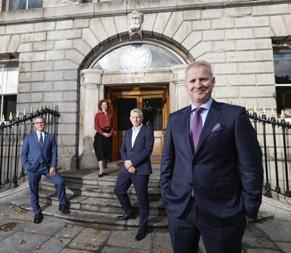
Two key objectives in the School’s strategic plan (20212026) are (i) to transform our undergraduate curriculum and (ii) to further embed simulation to support this educational transformation.
In terms of objective (i) and transforming the undergraduate curriculum, we have undertaken a four-stage redesign process of the undergraduate programme. To date, we have established our vision for the new programme by identifying the needs of future physiotherapy graduates, considering key political, economic, social, technological and environmental drivers, and completed curriculum mapping of our existing programme to identify redundancies and missing material (stage 1).
We have started to integrate our vision with student, stakeholder and staff expectations. For example, the CORU programme approval and Internal Quality Review process in 2021 provided feedback from a wide range of external stakeholders, and we have ongoing internal consultation with our student body via a StEP (Student Engagement and Partnership) project initiated this year (stage 2).
We are currently at stage 3, with workshops in May and June 2022 focusing on ‘putting it all together’ i.e. identifying our programme philosophy, learning theories and delivery methods; determining and configuring modules, content, activities for delivery and placement experiences so that it is integrated and flows and scaffolds throughout the programme. We aim to submit our transformed programme for approval in January 2023.
With respect to objective (ii) and the embedding of simulation, we tested the introduction of a one- week ‘simulated placement’ as a precursor to a five-week clinical placement on the undergraduate programme. The feedback from students and the hospital-based clinical tutors was very positive: “Best thing this semester-unanimously simulation!" (Pulse student survey); ”Looked like they have done it with patients before” (clinical tutor). Funding for a PhD project is due to start in October 2022, which will give added momentum to these exciting developments.

The School of Nursing and Midwifery is a vibrant education and research hub within RCSI.
Our education is exclusively postgraduate, and our key goal is to develop the clinical practice, educational and research capabilities of practicing nurses and midwives. In doing this, our students are enabled to make a true difference to the lives of the patients for whom they care. These students are ambassadors for the University and play a key role in leading the world to better health.
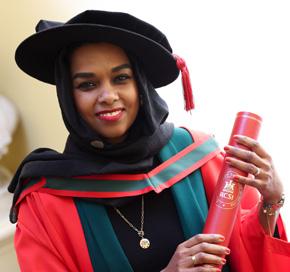
Our team of 25 delivers programmes, spanning the many dynamic fields of contemporary health provision, to more than 850 students annually. We are the largest provider of postgraduate nursing and midwifery education in Ireland, and our students, who work across diverse clinical specialties, can choose from 27 different educational programmes ranging from postgraduate certificate and postgraduate diploma to masters level.
This year, we were particularly excited to join RCSI Online to offer the Postgraduate Certificate in Wound Management and Tissue Viability, our first programme to be delivered in an exclusively online format. More than 50 students, within Ireland and internationally, participated and expressed great enthusiasm for the programme. We are particularly grateful to the RCSI Online team for its huge commitment and support, and we look forward to further expansion of nursing and midwifery programmes in the online space in the coming years.
Skin Wounds and Trauma (SWaT) Research Centre
Our research, based at the Skin Wounds and Trauma (SWaT) Research Centre, goes from strength to strength. With more than 30 publications and 450 citations this year, our staff and students have been very productive. Research by our 14 PhD students is key to our success in translating evidence into contemporary clinical decision-making to provide a platform for outcome-focused healthcare practice.
We are particularly delighted with the graduation this year of three PhD students, Dr Maisoon Mairghani, Dr Sorcha Byrne and Dr Natalie McEvoy. These students have been an inspiration to all of us as they battled with COVID-19 restrictions, yet successfully completed their studies. Collectively, they embody the words of radio and television broadcaster Earl Nightingale, who said “All you need is the plan, the road map, and the courage to press on to your destination". We wish them every success in their future careers.
Physician Associate students continue to represent RCSI in positive ways, through their strong clinical performance and governmental advocacy efforts.
The seventh cohort of students began their training in January 2022, representing the largest cohort to date, with 17 students from diverse backgrounds joining as Year 1 students.
At the June 2022 conferring celebrations, 13 Physician Associate students were conferred degrees, bringing
the total number of graduates to 52 since the programme’s inception. Employment prospects for graduates continue to be strong, with 60% of students securing professional posts before completing the programme. Currently the occupational demand exceeds supply, so graduates will continue to have strong employment prospects.
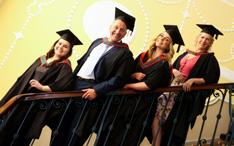
To address continuing national health workforce needs and facilitate the growth of the Physician Associate profession throughout the country, the programme is developing a hybrid option. This initiative, which will be piloted in 2023, aims to partner with local communities to recruit, select, educate and employ Physician Associates in order to address the persistent workforce challenges and enable students to take part in the programme without relocating to Dublin.
A Year 1 Physician Associate student has achieved recognition as the first international student to be selected as a Physician Associate Education Association (USA) Health Policy Fellow for the 2022-23 academic year. During this time, the successful candidate, Shannen Price, will engage with other physician associate students in the US learning about health policy and advocating for full inclusion of physician associates into health systems globally. Shannen will develop and implement an advocacy project during her fellowship year.
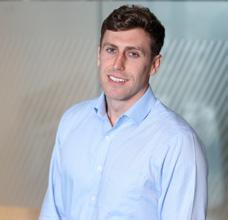
One of highlights of studying medicine at RCSI so far has been completing the new optional Certificate in Lifestyle Medicine, in parallel with my degree.
I’m proud to be among the first cohort of students, across the Schools of Medicine, Pharmacy and Physiotherapy, who will be awarded the certificate in July 2022.
Lifestyle Medicine is a relatively new term, and it embodies the core critical lifestyle behaviours that contribute to health and well-being across the lifespan, from early childhood to late old age.
Having completed the RCSI Certificate in Lifestyle Medicine, I now have a much more in-depth knowledge and understanding of the importance of the six pillars of lifestyle medicine: managing stress, nutrition, physical activity, sleep, smoking, and drug and alcohol use.
It was remarkable to learn about the impact daily lifestyle factors can have in the development, prevention, and treatment of disease. The course underlined that the application and alteration of lifestyle factors, not only improve patient outcomes, but also empower patients to take an active role in their own care.
With so many chronic illnesses linked to lifestyle factors, gaining this supplementary qualification during my studies has been an invaluable addition to my future career as a medical doctor.

The ambition of RCSI’s School of Postgraduate Studies (SPGS) is to be a leading centre for postgraduate education and research in medicine and health sciences.
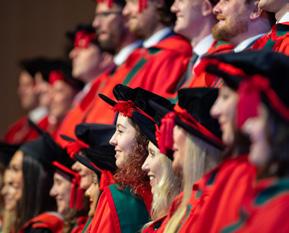
Our main strategic objectives are to oversee the quality of all higher degrees, provide a transformative learning experience and grow postgraduate research scholar numbers.
As part of our collaboration with Soochow University, China, seven StAR PhD scholars arrived in October 2021 (including two supported by the China Scholarships Council). New partnerships with Qatar University, Hamad Bin Khalifa University, Quatar and Sultan Qaboos University, Oman extend the global reach of SPGS. We also presented 10 International Secondment Awards in 2021/22, allowing research scholars to travel to renowned research institutes to develop new skills and build career networks.
In October 2021, SPGS launched MD and PhD by Prior Publication awards for RCSI staff and honorary appointments. Our first intake of scholars on these new programmes included four candidates (one PhD and three MD).
In 2021/2022, we graduated 67 scholars: 44 PhD, 12 MD, and 11 MSc (including two intercalated MSc). For the academic year 2021/2022, we registered 79 new scholars: 44 PhD, 32 MD, two MSc and one MCh.
We now have 21 RCSI StAR (Strategic Academic Recruitment) PhD and 34 RCSI StAR MD scholars (in collaboration with the Beacon Hospital, Blackrock Clinic, Bons Secours Hospital and the Hermitage Clinic). New agreements have been reached to extend our MD StAR partnerships to include the Mater Private Network, Highfield Healthcare and UPMC Whitfield. External funding for the StAR MD Programme was secured from GSK and Pfizer Healthcare Ireland.
SPGS funded two StEP projects in 2021/2022 to explore opportunities for postgraduate scholars to become members of RCSI Clubs and Societies and a pilot mentoring programme that will involve RCSI postdocs acting as mentors to postgraduate scholars. This project will commence in September 2022.
SPGS is also involved in the SFI Discover Award ‘Junior Researcher Programme’, which seeks to engage and inspire curiosity and confidence in science among junior cycle students in four RCSI partner DEIS (Delivering Equality of Opportunity in Schools) schools.

According to the World Health Organization (WHO), the world is facing a rapidly growing and unsustainable tsunami of lifestyle-related diseases. Current approaches to healthcare are not equipped to deal with the growing impact of such diseases.
The Centre for Positive Psychology and Health (CPPH) continued to expand this year in pursuit of its core mission to draw on the scientific disciplines of lifestyle medicine, positive psychology and positive organisational scholarship to enhance human health and wellbeing.
The Director and staff of CPPH are grateful to have attracted very significant external philanthropic funding this year, which has allowed rapid expansion across the Centre’s three pillars: education, research and public engagement.
CPPH’s standing in terms of postgraduate education has been secured through the delivery of the Professional Diploma in Positive Health to a cohort that trebled in size this year. The successful accreditation of a new Masters in Positive Health Coaching and
the imminent accreditation of a new Professional Doctorate in Positive Health also reflect the development of critical mass in education.
Research projects have been launched in the areas of coaching and positive health, well-being in frontline healthcare staff, positive education and childhood well-being, and positive psychology interventions in chronic disease conditions. Three new PhD students achieved funding this year, and Professor Ashley Duggan from Boston College was awarded a Fulbright Scholarship to study positive psychology and relationships for health and medical sciences/ education at CPPH.
The focus on public engagement was reflected in the delivery of three free online courses on the Science of Health and Happiness, designed respectively for the general public, young people and those who are ageing. These courses were availed of by 32,000 (general course), 150,000 (young people’s course) and 3,200 (course on ageing) participants.
Professor Christian van Nieuwerberg, a major international figure in positive coaching research and practice, joined CPPH as Professor of Coaching Psychology this year and Dr Jolanta Burke, a leading figure in positive psychology research, joined as a Senior Lecturer. Professor Beth Frates, a leader in lifestyle medicine in the USA, joined as Visiting Professor of Lifestyle Medicine. Key appointments were also made in operations and research roles at CPPH with a new Senior Lecturer/Researcher focusing on systems approaches to increasing positive health and well-being and a new Lead Coach Supervisor specialising in health coaching.
CPPH faculty have participated in more than 100 public speaking events at local, national and international levels, and have collectively published approximately 60 general and scientific articles in global media and academic literature. Three books have been published this year and a further three are in press. CPPH’s new book Positive Health: 100+ Research-based Positive Psychology and Lifestyle Medicine Tools to Enhance Your Wellbeing, published by Routledge, will introduce professional and lay audiences to the evidence base for interventions designed to enhance health and wellbeing.
The focus on public engagement was reflected in the delivery of three free online courses on the Science of Health and Happiness.Sara McDonnell Executive Director, Graduate School of Healthcare Management Professor Robert McMurray Academic Director, Graduate School of Healthcare Management
The Graduate School of Healthcare Management (GSM) offers a suite of postgraduate academic programmes in healthcare management, leadership, innovation, quality, safety and digital health, and has undergone a significant transformation in the past two years.
During the pandemic, our delivery model moved from a combined in-person and online programme to a wholly digital-enabled learning model. With the core content of all our programmes delivered online, learner participation is location independent, allowing us to broaden impact. This reach supports the strategic ambition of the University to grow postgraduate education and increase access, and delivers on our ambition to lead the world to better health.
Over the past year we fine-tuned our teaching and learning approaches, optimised systems usage and leveraged technology within the University to offer
an enhanced student experience with engagement and community at the core. We have expanded our programme suite, building on our core healthcare management and leadership portfolio. Our Masters in Healthcare Management is the most popular masters programme at RCSI and consistently exceeds targets year-on-year.
Healthcare systems support is fundamental to what we do. In Ireland, GSM Executive Management supports the HSE and RCSI Hospitals Group, facilitating the development of the management and leadership skills necessary to lead and deliver healthcare services today. The provision of leadership programmes with a multidisciplinary team focus has been extended by the HSE, aligned to Sláintecare implementation. This aspect of our work is also gaining traction in the United Arab Emirates (UAE) and wider Gulf Cooperation Council (GCC) through ongoing community and industry engagement with organisations such as Johnson and Johnson (J&J). This year saw the J&J EM-Power Programme provide 55 high-potential women leaders with an opportunity to embark on a personal development journey and to develop the skills to take on a leadership position.
Delivery of the J&J EM-Power Programme also aligns with our commitment to equality, diversity and inclusion initiatives, further evidenced by our involvement in the annual 30% Club scholarship programme. This programme, offered by GSM on behalf of the University, aims to address under-representation of women in leadership and managerial roles. The School also works with the College of Surgeons of East, Central, Southern Africa (COSECSA) providing Train the Trainer programmes and supports programme participation in subSaharan Africa through scholarship opportunities.
Eunan Friel Managing Director, Healthcare Management
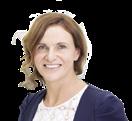

The competency and expertise of the Graduate School of Healthcare Management (GSM) has been a key enabler for the development of RCSI’s online capability.
Driven by an evolving education landscape and a University imperative to pursue growth in postgraduate programme provision, RCSI established RCSI Online as an enabling vehicle to support domestic and international growth in online, digital-first provision across RCSI.
RCSI Online stakeholder expertise from GSM, IT, the Health Professions Education Centre (HPEC) and Marketing facilitates the development, marketing and delivery of digital-first online programmes. Critical capabilities include programme development, marketing, lead generation, CRM pipeline management, student recruitment and programme coordination across a number of schools. GSM digital-first programmes in Clinical Leadership and Digital Transformation and a new digitally-enabled version of the Masters in Healthcare Management are being showcased through the RCSI Online platform.
Teaching and education excellence has always been a priority at GSM in relation to postgraduate offerings and also in terms of the many contributions we make to undergraduate and postgraduate programming
across other University departments. In 2021/2022 we increased our focus on research with a growing academic team, new grants, world-leading publications and engagement with international bodies such as the World Health Organization (WHO), national government (informing policy on staff retention), healthcare leaders and local providers.
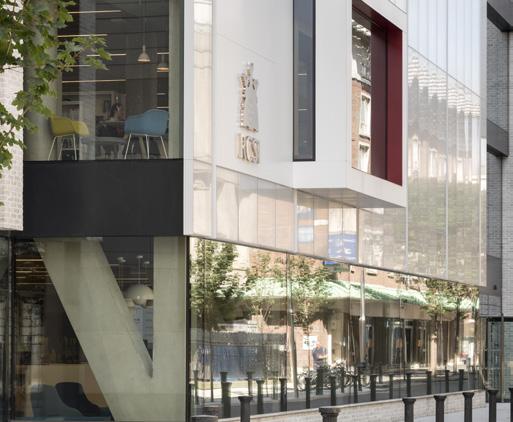
Data analysis informs all GSM activity, providing metrics to establish where students stall on their learning journey. A continuous improvement approach ensures students receive the best experience possible. Datadriven student recruitment activity is another a core activity. Enhanced organisational capability, business development and marketing competencies have precipitated the transition of our Dubai operations to a GCC commercial hub with an emphasis on proactive and nurturing student recruitment activity.
A busy year for GSM culminated in an internal quality review process, with outputs providing external validation of our ongoing evolution and the work of our international team who, daily, ‘care for the people, who care for people’.
Our delivery model moved from a combined in-person and online programme to a wholly digitalenabled learning model.
The Centre for Professionalism in Medicine and Health Sciences (CPMHS) was established in 2022, with a mission to advance medical professionalism in research, education and practice.
RCSI defines medical professionalism as ‘Forming values and developing behaviours and attitudes which foster professional relationships, promote public trust and enhance patient safety’.
Our vision is to provide global leadership in medical professionalism to achieve excellence in patient care and experience, caring for those who care, and promoting a healthier society through innovation in research, education and practice.
Professor Denis Harkin, appointed Chair of Medical Professionalism at RCSI in 2020 and now Director of CPMHS, will lead implementation of the Centre’s ‘Strategy 2025’.

CPMHS’s collaborative team between Dublin and Bahrain delivers education in medical professionalism across Foundation Year, Direct Entry and Graduate Entry Medicine. In 2021, a new Year 3 module, ‘Tomorrow’s Health Professionals’, combined professionalism, leadership, quality improvement and precision medicine. The Transforming Healthcare Education Programme (THEP) will introduce Personal and Professional Identity (PPId) as a vertical integrated pillar and we have co-designed case-based learning (CBL) across the new first and second years as well as designing bespoke professionalism lectures, workshops and assessment.
In April 2022, we delivered the second RCSI Medical Professionalism Annual Conference. The theme, ‘Rebuilding Safer Service’, attracted more than 900 registrants from 45 countries. There were keynote addresses from Jim Campbell (Director of Global Workforce, WHO), Professor Lord Ara Darzi (Imperial College London), Professor Colin West (Mayo Clinic), Dr Suzanne Crowe (President, Medical Council of Ireland), Professor Yvonne Steinert (McGill University) and Dr Hilary Jones (author, GP and TV celebrity).
We received an RCSI Collaborate grant to build our Medical Professionalism Research Network with partners at Queen’s University Belfast, Oxford University, McGill University Montreal, Harvard Medical School, Mayo Clinic and University of Sharjah, UAE.
Our thriving research group has particular strengths in digital professionalism, digital consent, resilience training and teambased learning. We have been awarded two RCSI StAR MD Research Fellowships (the VVEIN Study and SCAR Study) and a HEA North South Research Programme Grant to support the cross-border PROPER Study. We have published 17 manuscripts and articles in the last two years.
The Health Professions Education Centre (HPEC) aims to support RCSI to develop its goals with regard to teaching and learning, deliver evidence-based curricula and, ultimately, be an international leader in this field.
Our objective is to broaden HPEC’s involvement with staff across our campuses and the RCSI community, and
engage with them in the important task of developing our educational culture. HPEC’s strategy offers a range of new systems, networks and research initiatives reflected in ten goals with a five-year implementation plan.
Key achievements in the first year of the strategy reflect significant progress on these goals. We established an externally facing website and jointly manage the @RCSI_ Educate Twitter account. A range of new services has been created, including a consultancy service used by more than 200 staff. Our Educational Hub hosted more than 15 inperson and online events, focused on developing research, teaching and curriculum support.
HPEC has supported implementation of the new medical curriculum, including faculty development with more than 130 staff in Dublin and Bahrain facilitating the move to case-based learning as well as core learning and teaching approaches.

We continued to develop the Postgraduate Diploma in Health Professions Education as an online offering and places were extended to staff in Penang. The programme will be available to an external cohort in September 2022. HPEC also continues to lead the RCSI Peer Observation of Teaching.
Other activities include consultancy provision to RCSI Online, development of virtual patients for other departments and establishment of an evidence base for RCSI virtual patients. In the research and evaluation domain, we developed a framework to evaluate our educational interventions including RCSI’s Transforming Healthcare Education Programme (THEP), and have had success in achieving external Health Professions Education (HPE) grants. We also received international support and collaboration for our plans to develop an evidence base that RCSI is producing the ‘global doctor’.
Scholarly output by HPEC continues to flourish with more than 340 publications in the last five years. Events via the Educational Hub also target support for publications and research.
RCSI SIM Centre for Simulation Education and Research (RCSI SIM) innovates through world-class simulation-based experiential education and research to prepare graduates for future clinical practice.
Simulation-based experiential learning is a fundamental educational methodology at RCSI, which enables us to prepare clinicians for modern team-based healthcare. Our world-class facilities reflect our institutional commitment to healthcare simulation, preparing learners to provide outstanding and compassionate patient care. In 2022, RCSI SIM launched a five-year strategic plan designed to meet the challenges of a changing health service and to deliver transformative health education.
RCSI SIM has forged a collaborative partnership with CAE Healthcare to advance healthcare education, technology and research through simulation-based strategies. CAE Healthcare designated RCSI SIM a certified Centre of Excellence in 2021 – the first of its kind in Europe. Through collaboration with CAE Healthcare, we look forward to
improving patient safety and outcomes through healthcare simulation, education and applied research.
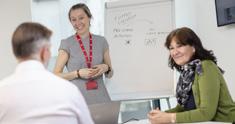

From 2021 to 2022, RCSI SIM supported over 30,000 hours of learning activities and training interactions with thousands of individual students encompassing a broad range of learners, from undergraduate training to continued professional development courses and postgraduate programmes.
Individualised learning opportunities drive the value proposition for RCSI SIM. Our team strives for student centredness through a student access programme that encourages self-directed skills practice. We value timely individual feedback and promote peer observation of learning and practice with student friendly resources. Participation in peer-assisted learning drives social-emotional engagement, provides accessible and actionable feedback, and fosters a sense of belonging and connectedness for our students.
Our simulated patient programme continues to evolve from strength to strength and we trained our 100 th simulated patient of the decade in 2022. These individuals support student learning by providing real opportunities for engaging and interacting with ‘patients’. Through this programme, students receive 360 degree feedback and build confidence and competence as they prepare for real patient interactions as future healthcare professionals.
Building on significant HEA funding, grants from the Irish Research Council and Movember have expanded the scope and activities of our education research efforts. Our innovative work is making several key contributions, in both specific simulation methodologies and feedback practices to promote communications skills, as well as interprofessional collaborative practice which forms the basis for modern team-based healthcare.
RCSI SIM also collaborates closely with the Department of Surgical Affairs to advance education in training in robotic surgery at RCSI and beyond.
Student Services recognises the benefits of extracurricular activities to both students and staff and supporting clubs, societies and student events is at the heart of everything we do.
As COVID-19 restrictions lifted, a balancing act was required to recommence in-person events that were enjoyable but safe. For Freshers Week, our undergraduate Students Union, recognising the challenges faced by newly-arrived students, created virtual activities for those in self-isolation, alongside in-person events.
Popular annual events like the RCSI World Cup Tournament, Cultural Diversity Month, International Night and the College Ball also returned to the calendar.
Despite changing COVID-19 guidance, our 87 clubs and societies continued to provide a vital source of engagement for students. A hybrid offering of virtual and in-person events meant normal student life resumed as much as possible. The 89th Biological Society Inaugural Meeting was held virtually in February with an in-person awards ceremony in April.
The Royal College Players (Drama Society) showcased student talent with a performance of ‘Legally Blonde: The Musical’.
The Chess Society hosted the 2022 Intervarsities with 132 players from 14 third-level institutions.
The Surgical Society hosted a virtual Intercollegiate
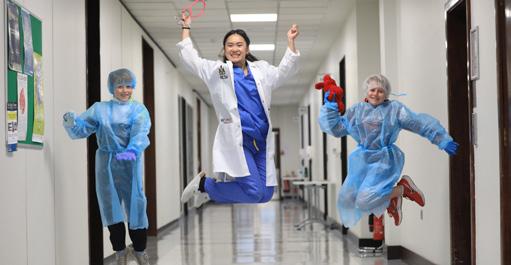
Case Competition, and the Emergency Society’s Trauma Day supported student learning in areas such as suturing and Wilderness Medicine.
The Paediatrics Society hosted the eighth annual Teddy Bear Hospital for 350 children and their teddies, raising over €3,000 in support of Barretstown Children’s Charity.
International Night also returned with attendees taken around the globe through music, dance and drama – a showcase of the many talents within the RCSI student body.
RCSI student societies succeeded outside of the University too:
• Choral Society won ‘Best Video’ at the All-Ireland Choral Intervarsities
• Dance Team were awarded second place in Contemporary Dance at the Dance Intervarsities, with Simrin Bains taking home ‘Best Performance/ Contemporary’ prize
• Emergency Society SonoGames team won silver at the inaugural National SonoGames Competition and gold at the SimWars Intercollegiate Competition
RCSI competed for a share of the Board of Irish College Societies (BICS) National Awards, taking home five awards:
• Emergency Society for ‘Best Society’ (Cultural/ Academic/Social)
• Cancer Society for ‘Best On-Line Event’
• PIBS for ‘Best In-Person Event’
• Katelyn Hudak (Surgical Society) for ‘Best Fresher’
• Olivia Jagiella-Lodise (Orthopaedic Society) for ‘Best Individual’
RCSI Sports Clubs had a successful year with students embracing the return of tours including to Paris and Boston, both longstanding traditions. In February, the RCSI Rugby Club competed against Université Pierre et Marie Curie (UPMC) in Paris. In April, nine students representing the Schools of Medicine, Physiotherapy and Pharmacy ran the Boston Marathon.
Other causes for celebration throughout the sporting season included:
• RCSI Men’s GAA team becoming league final champions
• RCSI Ladies’ Volleyball team winning the Tier 2 Cup Championship
• RCSI Squash Club winning the Men's A Championship
• RCSI Rowing Club taking home medals at their first University Championships
The Student Leadership Development Programme ran for its second year in early 2022, with 82 student leaders completing the four-week programme. Developed under the Student Engagement and Partnership (StEP) initiative, it focuses on four core themes: developing influential leadership skills; equality, diversity and inclusion; self-care and resilience as leaders; and data protection.
Recognising the financial challenges that COVID-19 brought, we continued to support students through the HEA Student Assistance Fund and the RCSI Alumni Hardship Fund. There was a marked increase in applications to both funds during the pandemic. Thank you to our alumni donors for their generosity.
While the RCSI Gym returned to more in-person activity, a number of online fitness classes and challenges continued. These included the third #RCSITogether10k, the ‘Veg Pledge’, encouraging students to eat more vegetables, and the No-Vember challenge created some great inter-departmental competition. The Gym team also contributed to events including Eating Disorder Week and Mental Health Awareness Week.
The RCSI Centre for Mastery: Personal, Professional and Academic Success (CoMPPAS) supports students through our team of committed education, career and welfare professionals. The CoMPPAS team also helps coordinate RCSI’s orientation programme and International Citizenship Award, as well as supporting tutoring programmes.
Due to the enormous challenges faced by students this year, CoMPPAS focused on the following:
• Student Welfare partnership with Students Union to deliver Health and Wellbeing Week
• Student Welfare partnership with Centre for Positive Psychology and Health to provide video resources for students
• Delivery of ‘Responding to Students in Distress’ workshops
• Evolution of the service into a hybrid model, delivered via consultations, workshops and tutorials
• Additional learning support tutors for students registered with the Learning Access and Facilitation Service (LAFS)
• Extension of the LAFS service to include occupational therapy where appropriate
• Collaboration with the Library team to introduce an online booking system for study spaces and library access for students with access and disability needs
• Successful pilot of a Career Partnering model for each school for the academic year 20212022; a Career Advisor was appointed to each school to increase awareness of supports available
• Career framework and programme of work rolled out for all schools, underpinned by the Stanford University Design Your Life (DYL) model
• E-portfolio initiative developed using CareerHub platform
• Event platform launched to enhance opportunities for hosting virtual events and leveraging data to support further reporting
• Collaboration with Students Union and student societies to run a Professional Identity series of six webinars, with nine international speakers, attended by over 300 students
• Partnership with students to establish the first Gold Humanism Honor Society outside of the USA
• Development of community of practice with career advisors in other third-level universities
A hybrid offering of virtual and in-person events meant normal student life resumed as much as possible.
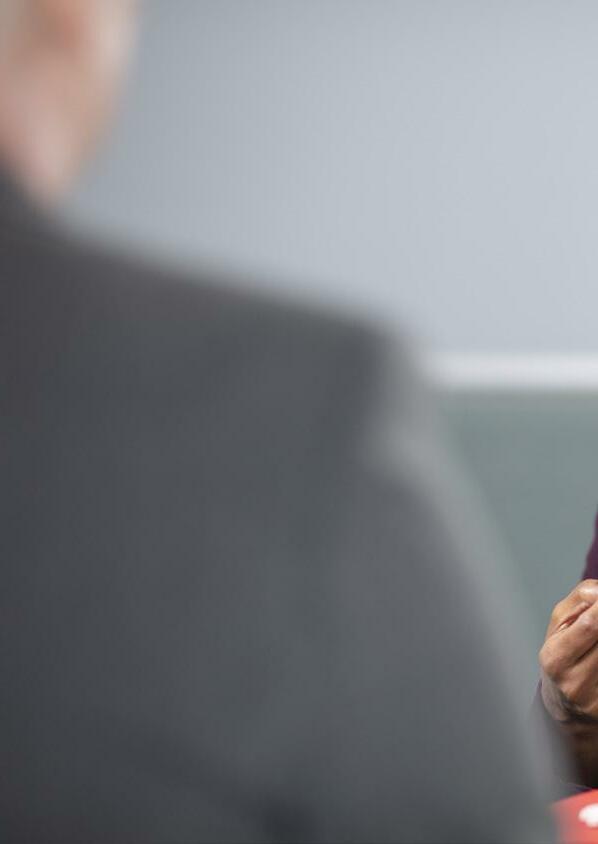
Immunotherapy harnesses the body’s own immune system to target cancer cells and offers a promising stream of new therapies for cancer.
ProfessorJarushkaNaidoo,
researcher,BeaumontRCSICancerCentre


RCSI’s research activity continues to grow with newlyfunded research programmes, collaborations with clinical and industrial partners and formation of new spin-out companies, which will bring our world-leading scientific breakthroughs closer to impacting directly on patient health.
We look back with great pride on another exceptional year for RCSI research, which is instrumental in RCSI maintaining its position in the top 250 universities worldwide in the Times Higher Education (THE) World University Rankings. Our studies are published in high-impact journals, external grant funding has increased yet again, we have developed new industry partnerships and we have further strengthened our links with our clinical sites. We continue to exceed externally-set targets for the commercialisation of our research and have approved the formation of four new spin-out companies in the past year. Our success is due to strategic decisions made in the past decade to invest in research supports and to the dedication of our research community. Our team at the Office of Research and Innovation (ORI) continues to support our researchers in their efforts to deliver world-class clinical and patient-centred studies that address national and international health challenges and ensure that research can be rapidly translated to the clinic. We showcase some highlights from the past year.
The Beaumont RCSI Cancer Centre – a collaboration between RCSI, Beaumont Hospital and St Luke’s
Radiation Oncology Network – has been accredited by the Organisation European Cancer Institutes (OECI) who set comprehensive standards for cancer centres in Europe. The Centre, independently evaluated by a team of experts, was praised as “a patient-centred organisation with well-coordinated research structures and a dynamic education system”.
The establishment of the Centre formalises the alliance and commitment to cancer care that has long existed between the three partners. I congratulate the Centre’s Medical Director, Professor Patrick Morris (Beaumont Hospital) and Scientific Director, Professor Leonie Young (RCSI Dept of Surgery) and the entire team for achieving this important milestone and look forward to seeing collaboration between the partners grow and develop.
The growth in research activity, supported by the School of Postgraduate Studies led by Professor Darran O’Connor and the ORI, has enabled a continued increase in the number of registered MD and PhDs. This growth has been achieved by increased focus on developing international partnerships with other universities such as Soochow University, China and expanded focus on supporting fellowship applications to agencies such as the Irish Research Council (IRC) as well as international doctoral training programmes. The structured PhD programme SPHeRE (Structured Population and Health Services Research Education) was re-funded by the Health Research Board (HRB) for the fourth time and we welcomed another intake of scholars on the StAR MD and Irish Clinical Academic Training (ICAT) programmes.
Patient and public involvement (PPI) in research Deepening patient and public engagement in research is one of our core strategic objectives and we were delighted to join the HRB- and IRC-funded PPI Ignite Network. I welcome Dr Michelle Flood (School of Pharmacy and Biomolecular Sciences) as the new RCSI PPI academic lead.
Deepening patient and public engagement in research is one of our core strategic objectives .Leading impactful research
RCSI Research Summer School (RSS), under the direction of Dr Niall Stevens (Clinical Microbiology), returned for a 12th year with more than 100 undergraduate students taking part. Following the relaxation of the pandemic restrictions, we were delighted that lab-based projects were possible again. Participating students were invited to come up with innovative solutions to pressing medical problems in the RCSI Student Innovation Challenge (SIC). This programme was a finalist at the recent Triple E Awards for the Innovation and Entrepreneurship Programme of Year Award. I congratulate the leaders of the SIC, Dr Aoife Gallagher (Head of Innovation) and Dr Shona Pfeiffer (Dept of Physiology and Medical Physics), on its continuing success.
Researchers at RCSI published a total of 1,739 PubMed indexed articles in 2021, communicating research from a broad range of health science disciplines. Not only are RCSI researchers prolific but they are highly cited, with more than 60% of publications from 2017-2021 being in the top quartile by citescore which is a key contributor to our performance in the Times Higher Education World University Rankings (2022). The following is a selection of articles published in high-
impact journals during the annual reporting period where the senior author was an RCSI staff member.
Discovery of a new way to target breast cancer that has spread to the brain A research project led by Professor Leonie Young (Dept of Surgery) examining tumour evolution from primary diagnosis in the breast to the metastatic spread in the brain, revealed a new therapeutic strategy for patients who previously had limited targeted therapy options. The results, published in Nature Communications, suggest these tumours are vulnerable to an existing type of drug known as PARP inhibitors, offering the prospect of better outcomes for patients with this particularly aggressive metastatic disease.
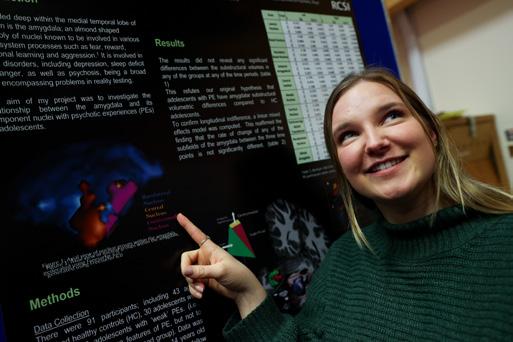
RCSI-led clinical trial reveals new treatment option for COVID-19
Professor Gerry McElvaney (Dept of Medicine) and Professor Gerard Curley (Anaesthesia and Critical Care) were lead investigators of the first Irish-led clinical trial of a medicine for COVID-19. The study investigated the effects of using anti-inflammatory protein, alpha-1 antitrypsin (AAT), to treat COVID-19 patients who have progressed to acute respiratory distress syndrome (ARDS). The trial demonstrated that AAT was effective in reducing respiratory inflammation in these critically-
ill COVID-19 patients, and forms the basis for a larger trial to see the effect on clinical outcomes. These results were published in Med
Breakthrough approach to repair peripheral nerve damage
A study from Professor Fergal O’Brien (Anatomy and Regenerative Medicine), in collaboration with medical technology company Integra LifeSciences, led to a breakthrough for nerve repair therapies. In pre-clinical trials, a novel extra cellular matrix (ECM)-loaded medical device known as a 'nerve guidance conduit', was developed and shown to support improved recovery responses following the development of traumatic nerve lacerations with substantial loss of tissue. By mimicking the body’s nerve repair processes, this new approach may eliminate the need for additional stem cells and drug therapies. The study was the highest-scoring paper from Matrix Biology ever tracked on Altmetric.
New blood clot research indicates enhanced understanding of wound repair
A study led by Dr Ingmar Shoen (Pharmacy and Biomolecular Sciences) examined the behaviour of platelets at a wound site using super-resolution microscopy, specifically their ability to sense their location within a blood clot and remodel their surroundings accordingly. The results, showing for the first time that platelets not only form the clot but also can initiate its remodelling by erecting a fibrous scaffold, were published in Science Advances
Breast milk proven to enhance heart performance in premature babies
Professor Afif EL-Khuffash (Paediatrics and Rotunda Hospital) led a study demonstrating the beneficial effect of breast milk consumption on cardiovascular health and early cardiovascular development in premature infants. The study, published in JAMA Network Open, showed that preterm infants who are fed their mother’s own milk demonstrate recovery of their heart function to levels comparable to healthy term born infants while preterm infants fed formula do not.
A research project led by Dr Paula Byrne (HRB Centre for Primary Care Research, Dept of General Practice), revealed that the link between ‘bad’ cholesterol (LDL-C) and poor health outcomes, such as heart attack and stroke, may not be as strong as previously thought. Statins are widely prescribed to lower LDL-C but this study showed statins had an inconsistent and inconclusive impact on outcomes such as myocardial infarction and stroke. These findings, published in JAMA Internal Medicine, indicate that the benefit of taking statins may be small and that clinical guidelines and policy should be updated.
In 2021, the growth in RCSI’s knowledge transfer performance continued with RCSI again exceeding targets independently set by Knowledge Transfer Ireland (KTI), with the value of research commercialisation funding reaching €2.4 million. RCSI’s world-class research expertise and focus on commercial application is greatly assisted by the Innovation team in the ORI led by Dr Aoife Gallagher. Industry engagement, as measured by number of agreements, exceeded targets by 18% and industry funding grew to €5.2m (from €4.5m the previous year), demonstrating the quality of our applied research portfolio and industry support team in the ORI, led by Dr Seamus Browne.
In our most successful year ever, RCSI approved the formation of four new spin-out companies. Inthelia Therapeutics, founded by Professor Steve Kerrigan (School of Pharmacy and Biomolecular Sciences) is developing novel treatments for sepsis. Vertigenius, a joint RCSI-Trinity spin-out company led by Dr Dara Meldrum, previously of the RCSI School of Physiotherapy, is focused on developing a digital health solution for patients with balance disorders. PrOBMet, founded by Professor Leonie Young, Dr Damir Vareslija and Professor Arnold Hill (Dept of Surgery), is developing targeted treatments for breast cancer brain metastatic patients, and Phyxiom, founded by Professor Richard Costello (Dept of Medicine), is a health analytics platform that transforms the clinical outcomes of patients with uncontrolled asthma and other chronic respiratory diseases.
RCSI’s FutureNEURO SFI Research Centre co-leads on €10m Precision ALS industry programme
FutureNEURO and Science Foundation Ireland (SFI) ADAPT Research Centre are co-leading an academic, clinical and industry research programme, Precision ALS, to develop advanced data-driven prediction models of disease progression and clinical insights and treatment for motor neurone disease. The programme is supported by €5m from SFI and matched funding from industry partners.
RCSI secured research funding from a wide range of funding bodies, both national and international. The total external funding awarded to RCSI for the calendar year 2021 was €37.5m, up from €31.5m in 2020.
Examples of a number of the larger RCSI-led awards in the last 12 months include:
• Professor Seamus O’Reilly; Cancer Trials Ireland Network. HRB Cancer network: €6.9m
• Professor Mary Clarke; Structured Population Health, Policy and Health Services Research Education (SPHeRE 3). HRB PhD Programme: €6m
• Professor Paul McNally; Children’s Health Ireland. HRB Clinical Research Centres: €3.3m
• Professor Patrick Morris; RCSI Beaumont Cancer Cluster. HRB Cancer Cluster: €2.5m
• Professor David Cotter; Psychosis Ireland Structured Training and Research Programme. HRB Collaborative Doctoral Award: €1.5m
• Professor James O’Donnell; Defining the mechanisms through which enhanced clearance contributes to the pathogenesis of the common inherited bleeding disorder Von Willebrand disease. SFI Frontiers for the Future Programme Award: €1.3m
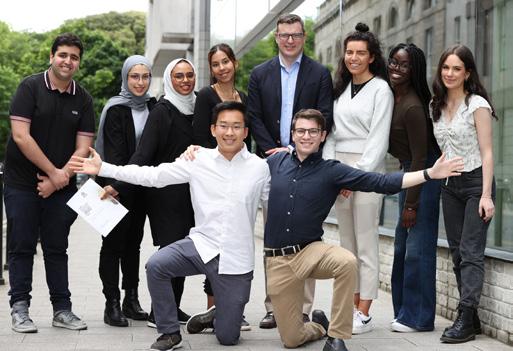
• Professor Tracy Robson; Breaking the obesity-cancer link; a theranostic role for FKBPL in modulating immunometabolism across disease progression in
oesophageal adenocarcinoma. SFI Frontiers of the Future Programme Award: €1.2m
• Dr Roger Preston; New approaches to exploit coagulation protease-receptor signalling for therapeutic benefit. SFI Frontiers for the Future Programme Award: €950,000
• Dr Annie Curtis; Chrono-Vac: Harnessing the chronobiology of skin dendritic cells to boost vaccine efficacy. SFI Frontiers for the Future Project: €625,000
• Professor Annette Byrne; Leveraging chromosomal instability for improved diagnosis and treatment in bevacizumab-resistant metastatic colorectal cancer. SFI Frontiers for the Future Project: €620,000
• Dr Claire Conway; Digital models for next generation mitral prostheses. SFI Frontiers for the Future Project: €620,000
• Professor Jochen Prehn; National Spatial Tissue Profiling (NaSPro) Platform for Precision Medicine: Integration of chemical, brightfield and fluorescence imaging of tissues combined with single cell molecular profiling. SFI Research Infrastructure Programme: €602,000
Professor Hannah McGee (Deputy Vice Chancellor for Academic Affairs) and Professor Mary Cannon (Psychiatry) were elected Members of the Royal Irish
Academy (MRIA), Ireland’s foremost body of experts in the sciences and humanities. Professor Cannon was also named one of the most influential researchers in her field, with multiple highly-cited papers that rank in the top 1% by citations for field and year in the Web of ScienceTM.
Professor Fergal O’Brien (Anatomy and Regenerative Medicine) and partner company Locate Bio were announced winners of the KTI Commercialisation Impact Award 2021. Working with Dr Aoife Gallagher’s team in the ORI, Professor O’Brien’s group licensed three orthobiologic patents to Locate Bio, which is focused on bringing the products to market.
In March 2022, we held the first in-person Research Day since 2019 thanks to the organising committee, co-ordinator Dr Christopher Byrne (ORI) and outgoing academic co-ordinator Professor Darran O’Connor (Pharmacy and Biomolecular Sciences).
The John J. Ryan Lecture 'Immune Escape in Breast Cancer' was delivered by Professor Kornelia Polyak of the Dana Farber Institute at Harvard University.
The RCSI Vice Chancellor Innovation Awards, recognising the outstanding contribution of RCSI researchers to research commercialisation and industry engagement activity, were presented by RCSI Vice Chancellor Professor Cathal Kelly. The award winners for Commercialisation, Industry Engagement, and Clinical Engagement were Professor Steve Kerrigan (Pharmacy and Biomolecular Sciences), Dr Tobias Engel (Physiology and Medical Physics) and Professor Killian Hurley (Dept of Medicine). Professor David Henshall (Physiology and Medical Physics) received the award for patent granted.
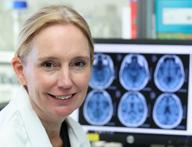
As Scientific Director of the Beaumont RCSI Cancer Centre, I am proud to contribute towards our vision of providing pioneering cancer care to patients in Ireland by combining first-class clinical care with ground-breaking translational research and high-quality education and training.
The Centre’s ambitions were cemented this year when we received accreditation for the quality and standards of cancer care and research by the OECI, a European organisation who set comprehensive standards for cancer centres and networks.
Our objective is to have 10% of cancer patients in Ireland on clinical trials, giving them access to new advanced treatments.
My team’s research, which focuses on developing targeted treatments for advanced breast cancer, is among the programmes that draw on the collaborative expertise of the Centre. Building on our experience in breast cancer care and research, I have co-founded PrOBMet, a spin-out company from RCSI.
PrOBMet is developing targeted treatments for patients who have received a diagnosis of metastatic breast cancer that has spread to the brain, which has few therapeutic options.
Our approach differs from current treatments; we have genomically profiled primary and metastatic tumors from cancer patients to identify a new drug target that we predict will be highly efficacious and will help combat drug resistance.
We hope that within five years, we will bring this therapy to clinical trial. Our ultimate goal is to develop treatment options for these patients to give them a longer, healthier life.
total external funding awarded to RCSI for the calendar year 2021 was €37.5m, up from €31.5m in 2020.Leading impactful research






• 4,092 collaborating research institutions worldwide (SciVal 2012– 2021)
• Completion of SURG-Africa project to improve access to surgical care for district and rural populations in Africa.
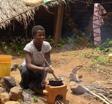
• Kapuscinski Development Lecture on surgery, poverty and international development delivered by RCSI Chair of Global Surgery
• Zero to landfill policy for waste
• Elimination of paper cups from staff rooms
• Single-use plastic removed from cafés

• 38,957 registrations for free online courses on The Science of Health and Happiness from the Centre for Positive Psychology and Health
• RCSI Library exhibition celebrating Sir Charles Cameron and his contribution to public health in Victorian Dublin
• 5,380 registrations for RCSI MyHealth public lecture series 2021/22
• Race Equality Action Plan published, aimed at advancing race equality and tackling racism
• RCSI guide for Ukrainian doctors coming to work in Ireland

• #33 in the world in Times Higher Education (THE) Impact Ranking 2022

• Strong health research: 5,996 publications and 82,000 citations (SciVal 2017-2021)
• Beacon Status Award from the Centre for Sustainable Healthcare (first institution in Ireland)

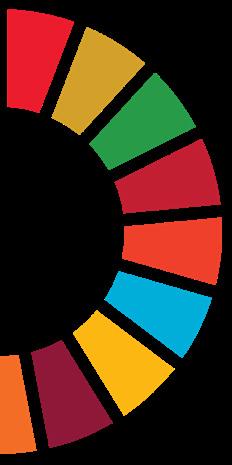
• Beaumont RCSI Cancer Centre designated Cancer Centre status by OECI
• National Surgical Research Support Centre launched

• Inaugural Chair of Population Health appointed
•

RCSI Summer School in its 12th year
• New BSc in Advanced Therapeutic Technologies
• 28,000 health professions alumni across 98 countries


• Student electives in 20 countries with 223 collaborating healthcare institutions
• First cohorts of 313 Lifestyle Medicine certificate participants
• 29th Carmichael Lecture by Ms Amina J. Mohammed, Deputy Secretary General of the United Nations, on ‘Transforming Education to Transform our World by 2030’

• Fourth year of the PROGRESS Women in Surgery Fellowship
• Scholarship in Positive Health launched in collaboration with the 30% Club
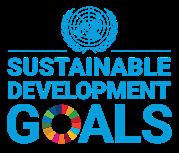
• Women in Vision and Eye Research conference
• Athena SWAN bronze awards for the School of Pharmacy and Biomolecular Sciences and Department of Physiology and Medical Physics
• 100% green electricity procured
40% improvement in energy efficiency(kWh/sqm) since baseline 2006

• Best Green Campus Award at the 2022 Education Awards
• KeepWell Mark re-accreditation by IBEC for commitment to employee well-being
• Business & Finance 100 top companies for Workplace Wellbeing
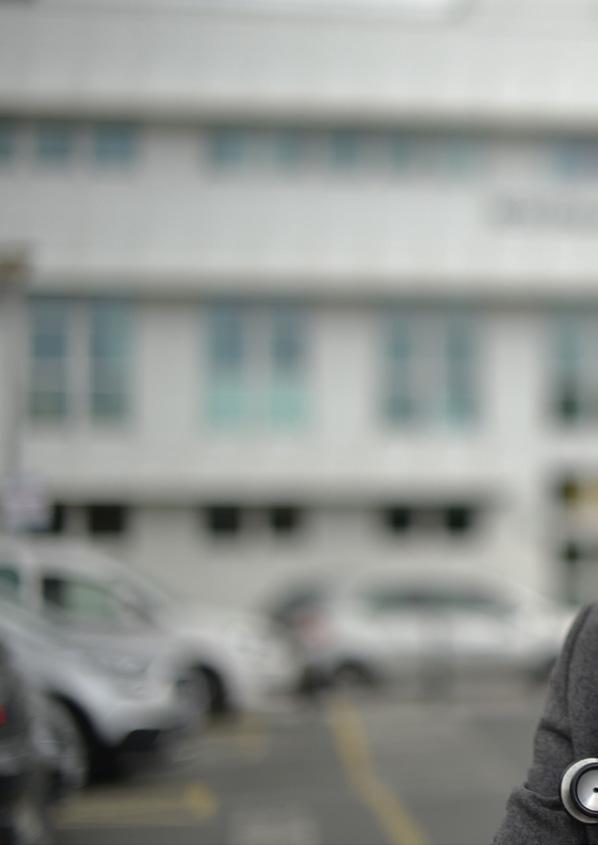
have a responsibility to empower the public with a deeper understanding of their own health.
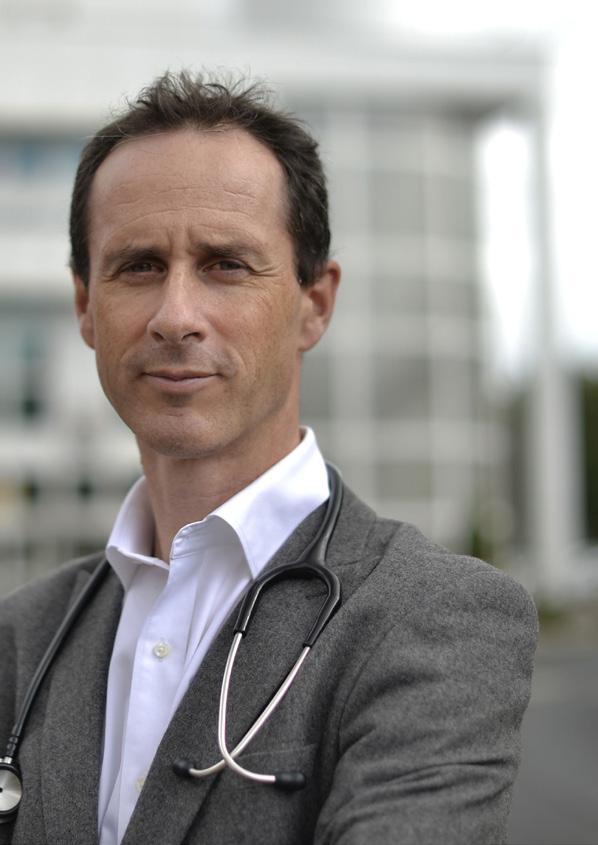

At no time in our history was this more important than during the COVID-19 pandemic. Throughout the crisis, RCSI staff and students worked on the frontline in hospitals and pharmacies, our researchers made great strides in virus treatments, and our experts helped advise policy makers as well as the public on the response.
Through our RCSI Engagement Committee we are building on this work to further our relationships with and within communities locally and nationally. This includes focusing on engaged research and teaching, student volunteering, access and participation and public engagement and outreach.
In the year, we were recognised for our commitment to student engagement, which includes encouraging student volunteering and community work, by being named The Sunday Times University of the Year for Student Engagement.
Since February 2022, we have responded to the devastating war in Ukraine. Our Surgical Affairs teams enrolled Ukrainian doctors in Ireland as Affiliate Members, providing them with free CPD courses to maintain their skills, competencies and formal qualifications.
We also joined the Scholars At Risk international and Irish network of universities whose collective mission is to protect scholars and promote academic freedom. This includes looking to host post-doctoral academics affected by conflict in any country. Our admissions team also joined the National Student Researcher Helpdesk and the Medicine Working Group to support and advise Ukrainian and Irish medical students displaced by the war.
The Engagement Committee recognises the crucial link between planetary health and human health and developed an action plan setting out how RCSI will play our part in achieving the United Nations’ Sustainable Development Goals (UNSDGs). These goals provide the international roadmap which organisations must follow to shape a healthier, fairer and safer world.
Key developments during the year included working with our students to raise awareness of the stark inequity that exists across the globe for access to COVID-19 vaccines and other treatments.
RCSI became the first higher education institution and postgraduate training body in Ireland to call on the Irish government to endorse the Trade-Related Aspects of Intellectual Property Rights (TRIPS) waiver which would pave the way for the generic production of medicines and provide low- and middle-income countries access to COVID-19 vaccines and other treatments.
Our commitment to achieving the UNSDGs was recognised by the Times Higher Education (THE) University Impact Ranking 2022 which positioned RCSI in the Top 50 in the world for SDG3 ‘Good Health and Wellbeing’.
As Ireland’s only university dedicated solely to medicine and health sciences, RCSI is in a unique position to direct our research, education and clinical care towards the most pressing health issues.
Abi Kelly Director of International Engagement and External Relations
The Engagement Committee recognises the crucial link between planetary health and human health and developed an action plan setting out how RCSI will play our part in achieving the UNSDGs.Supporting healthcare and society
The RCSI Engage vision is to enhance human health and education by building reciprocal partnerships between RCSI staff and students and our local and national communities.
RCSI Engagement Committee, relaunched in 2021, is co-chaired by Abi Kelly and Professor Kevin McGuigan and led by Maria Kelly, Head of RCSI Engage. Crosscampus working groups have been established to strengthen our local, national and international community engagement to make a sustainable impact on education and health for all.
REACH (Recreation, Education And Community Health) RCSI is the local community engagement and access programme connecting RCSI with our local community, promoting health and facilitating access to education for groups traditionally underrepresented.
Community partnerships and involvement of RCSI students and staff through volunteering, communityengaged learning and staff/student partnerships are central to the reciprocal nature of the programme.
In December 2021, REACH RCSI safely connected RCSI students with primary school children in making and delivering festive gifts to older people in the local area.
In place of the annual Christmas celebration for older people, 100 gift bags were hand-delivered by staff and student volunteers to older people in the local community. These gifts included decorations created by local primary school children during virtual decoration-making workshops demonstrated by students from RCSI Dublin Outreach Society and RCSI Association of Women Surgeons.
RCSI was also delighted to donate bicycles to local residents, youth and community groups to support health and wellbeing in the community.
REACH RCSI piloted a new initiative with the RCSI School of Physiotherapy for students to promote physical activity among local primary school children.
SFI Discover funding was awarded to REACH, under the leadership of Maria Kelly, to develop the Junior Researcher Programme to engage and inspire curiosity and confidence in science among junior cycle students of four DEIS (Delivering Equality of Opportunity in Schools) schools. Interactive laboratory sessions led by RCSI researchers and PhD scholar mentors aimed to encourage participants to develop interest in and enthusiasm for science. The Programme increases awareness of the diversity of STEM careers, pathways to those careers and supports and opportunities available for students.
RCSI is a proud member of a consortium with University College Dublin (UCD), Institute of Art and Design (IADT), Marino College of Education (MIE), National College of Art and Design (NCAD) and Trinity College Dublin (TCD) in this HEA PATH (Programme for Access to Higher Education) initiative committed to increasing participation by under-represented groups in higher education.
RCSI PATH Network representatives are Celeste Golden (Admissions) and Maria Kelly.
This year, collaborative initiatives included Creative Arts Summer School (CASS) and Dublin Learning City Festival 2022.
Dublin City Learning aims to ensure that education and learning are accessible for all individuals, regardless of age or background, in both traditional and nontraditional settings. The annual Dublin Learning City Festival 2022 took place in March and nine RCSI representatives shared learning opportunities through a diverse programme of events.
Four RCSI students received 1916 Bursaries this year in this HEA-funded initiative, which supports students from target groups under-represented in higher education.
Due to COVID-19 restrictions in early 2022, the Transition Year MiniMed programme was held virtually for the second time. Online delivery meant this consistently over-subscribed event could be opened to a record number of students, with more than 6,000 registrations across the Mini Medicine, Pharmacy and Physiotherapy programmes.
Budding healthcare professionals learned what it’s really like to train and work as a doctor, with talks and video sessions across general practice, heart surgery, pathology, paediatrics, forensic medicine, transplants, obstetrics and gynaecology. Our expert speakers took time out of their busy clinical and academic schedules to deliver informative and, most importantly, inspiring sessions throughout the week.
Feedback from teachers and parents was excellent, and for a number of students it cemented their plans to pursue a career in healthcare.
Following COVID-19 public health guidelines, the RCSI MyHealth lecture series continued as prerecorded, virtual events for 2021/22.
The autumn/winter 2021 lectures focused on learning to live well while emerging from the pandemic, with RCSI experts leading discussions about Long COVID, booster vaccines and the pillars of lifestyle medicine. Later in the series, our experts addressed topics including
positive ageing, heart health, peri-menopause and menopause, cancer and neurological disorders.
The transition to virtual delivery of the RCSI MyHealth series has led to far greater reach and impact of these important discussions, both nationally and internationally. More than 5,000 people registered for virtual events in the 2021/22 series, with a particularly high level of registrations for the episode on ‘Living well through perimenopause and menopause’.
The eight RCSI MyHealth episodes in the 2021/22 series have had more than 13,000 views on YouTube. For the 2022/23 series, episodes will be available in both video and podcast form, to further amplify their reach.
The RCSI MyHealth Expert Directory is a resource for journalists that brings together details of RCSI experts, across a range of healthcare issues and concerns, in an online listing.
In support of the UN Sustainable Development Goal to promote good health and wellbeing, these academics, clinicians and researchers are willing to engage with the media in their area of expertise so they can empower people with information that leads them to better health.
The Expert Directory has been of particular relevance since the onset of the COVID-19 pandemic and this relevance has continued in 21/22. RCSI was mentioned in 5,792 media articles and segments in Ireland in 2021, driven by the contributions of RCSI expert spokespeople.
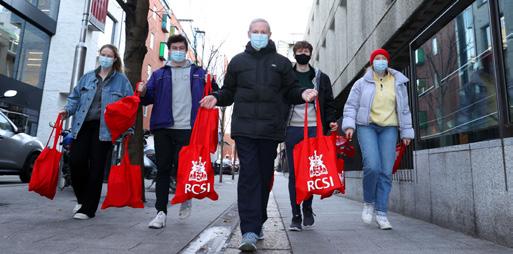
The Institute of Global Surgery (IGS) works to improve underserved populations’ access to high quality surgical care. We do this by supporting the training, retention, upskilling and career progression of the surgical teams that deliver these services. We have broadened the scope of our work beyond surgery and anaesthesia to involve operating theatre nurses and obstetrics providers.
Underserved populations and geographic remit Most of our work continues to be in sub-Saharan Africa where 93% of the population lacks access to safe surgical care. We focus on children and rural communities in particular. We also work with partners around the world, from Guatemala to Vietnam.

The collaboration programme between RCSI and the College of Surgeons of East, Central and Southern Africa (COSECSA), supported by Irish Aid, is in its 15th year. Some notable highlights in 2021/2022 include:
• COSECSA’s continued expansion, with 979 current surgeons-in-training in 20 countries, and more than 630 surgeons graduated
• The first cohort of 19 anaesthesiologists graduated from the College of Anaesthesiologists of East, Central and Southern Africa (CANECSA) with 65 now in training. The College of Anaesthesiologists of Ireland is a key partner in this work
• Working with the East, Central and Southern Africa College of Nursing and the RCSI Faculty of Nursing and Midwifery, to develop an in-service perioperative nursing e-learning programme
• The first intake of COSECSA training programme directors to the RCSI Graduate School of Healthcare Management Professional Diploma in Clinical Leadership
IGS led the Global Surgical Training Challenge Mentorship Programme into its final year. This Challenge supports the creation of novel surgical training simulation modules for low-resource contexts. A total of US$5 million in grant funding is awarded as part of the Challenge.
The Pan-African Paediatric Surgery E-learning Programme, which we deliver in partnership with COSECSA, the West African College of Surgeons and KidsOR, provides a common paediatric surgical training programme to more than 120 paediatric surgical trainees in 15 African countries.
In March, we were announced as the education partner for the ambitious United Nations Global Surgery Learning Hub by UN Assistant SecretaryGeneral Nikil Seth.
Other educational activities include global surgery teaching to RCSI masters students and nonconsultant hospital doctors (NCHDs) and facilitating student medical electives. Our global surgery education and training programmes could not be delivered without the support of more than 60 RCSI
As signatories to the UN Sustainable Development Goals accord, we are committed to fostering improvements in communities globally.
Professor Ruairi Brugha Interim Chair of Global Surgery
Most of our work continues to be in sub-Saharan Africa where 93% of the population lacks access to safe surgical care.
staff and faculty contributing above and beyond their everyday work.
In March, we hosted the first Dublin meeting in Patient-Centred Global Surgery. Speakers included the President of CANESCA, the Director General of Health, Malaysia and the Vice Chancellor of University of Global Health Equity, Rwanda. More than 200 delegates from 20 countries participated.
IGS is a leading centre for global surgery research, working to achieve scientific excellence, capacity building and translation of knowledge into policy and practice. Based on over a decade working in Africa, we have established a number of partnership collaborations to support strong and sustainable surgical and healthcare systems and to promote health equity. Initiatives for 2021-22 included:
• KidSURG, a partnership with global medical technology company, BD (Becton, Dickinson and Company), developed in collaboration with leading Malawian paediatric surgeon, Professor Eric Borgstein, is working to expand surgical access for children to a population of eight million in Malawi
• Akazi (meaning ‘women’ in Chichewa), a project that promotes a systematic approach to breast
With thanks to Irish Aid for their generous support of the RCSI/COSECSA collaboration programme.
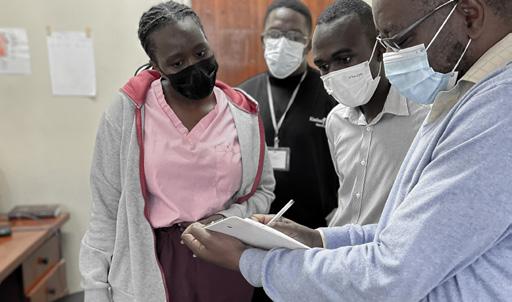
cancer control in Malawi and the efficient utilisation of resources through improving survival, reducing suffering, and lessening the cost of prolonged care for patients and their families, is a collaboration between RCSI, the Agency for Scientific Research and Training (ASRT) and Kamuzu University of Health Sciences. It is funded by the Irish Research Council (IRC) COALESCE programme
• Medical Licentiate Development Tracker (MeLD Track), a project generating evidence on career trajectories of non-physician clinician surgical providers in Zambia, is supported by IGS in collaboration with Heidelberg Institute for Global Health, SolidarMed, and the Surgical Society of Zambia
Critical to our success is the support we provide to early career researchers, through an active portfolio of short- and medium-term research projects. In 2021-22, we hosted six Research Summer School students, many RCSI student volunteers and one visiting scholar from the USA. IGS is home to two PhD projects (StAR and Fulbright scholarships), investigating patient-centred surgical care in Africa.
IGS Director of Research, Dr Jakub Gajewski, has been appointed Senior Lecturer Extraordinary at Stellenbosch University in South Africa.
We have also launched a research consultancy service, providing technical assistance to partners in short, specialised studies. Our first project is to support Misean Cara, assessing the impact of COVID-19 on health facilities in East Africa.
Bringing together the global surgery community across timezones and language barriers is a mammoth task, but this collaboration is critical to the success of our work.
I am mainly focused on developing e-learning surgery programmes, across the COSECSA region, but my work has now expanded beyond these countries and into other specialties.
Our Pan African Paediatric Surgery E-learning Programme is the first collaboration of this kind between COSECSA and the West African College of Surgeons. Bringing together over 70 paediatric surgeons, the programme is designed by African surgeons for African surgeons.
I support the mentorship programme for international teams in the Global Surgical Training Challenge, which also includes South America. This involves coordinating a mentorship panel of experts, from RCSI and beyond, on topics from simulation to project management.

We have begun closer collaboration with the East, Central and Southern Africa College of Nursing on perioperative nursing e-learning programme with 17 nurses and other healthcare professionals from clinical operating departments from six African countries and Ireland sharing their experiences.
This year, I started work on a worldwide projectthe United Nations Global Surgery Learning Hub, a single go-to resource for global surgery training and education material across all specialties: surgeons, anesthesia providers, obstetricians, gynecologists and perioperative nurses.
Global surgery is a very broad field and interprofessional cooperation is key. What strikes me when I attend conferences, regardless of the specialty, is how they are united in their dedication to making progress for their communities.
People of the village of Nsungwi unloading 200 mbaulas (improved cookstoves) that will be distributed as second stoves to complete multiple tasks such as cooking and heating water simultaneously. The mbaula is locally made and cheap, and villagers will also be trained to make them.
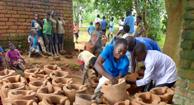
The Smokeless Village Project is a collaboration between RCSI’s Department of Public Health and Epidemiology, Kamuzu University of Health Sciences, Malawi, and the University of Nottingham, UK.
Household air pollution (HAP) is the world’s largest environmental source of ill health. Almost four million people die each year from the incomplete combustion of solid fuels used on traditional stoves or open fires and the use of kerosene lamps for lighting. To date, research projects are generally planned and implemented without active involvement of the community in decision-making processes. The Smokeless Village Project takes a more holistic ‘settings’ approach and promotes community-based participation. The project to develop the concept of a smokeless village is based in a small village 25km from Blantrye, Malawi. Nsungwi village in Chiradzulu district is in a rural setting and includes approximately 180 households.
The project, funded by the Irish Research Council (IRC) COALESCE programme, incorporates both quantitative and qualitative methods. We measured quantitative baseline indicators of HAP through survey methods and used interpretive methods including photovoice, focus groups and community mapping to identify community perspectives on HAP. The community then chose the interventions they wished to acquire and the project has provided Malawian-made ‘mbaula’ improved cookstoves, household solar lamps, a community solar charger and aluminium to make pot lids. In addition, the community has purchased timber and hired a local carpenter to provide windows for ventilation in the kitchens, as well as learning composting skills to use waste effectively.
Our next step is to evaluate whether the interventions chosen by the community have resulted in lower levels of air pollution in the households. At the end of the project, findings will be shared with relevant stakeholders including policy makers and will inform the development of a template for community-based engagement that can be used in similar settings to encourage expansion of the smokeless village concept more widely.
Dr Ines Perić, Education Programme Officer, Institute of Global Surgery
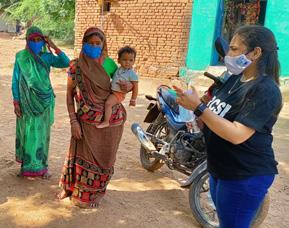
The PANIWATER Project, coordinated by Professor Kevin McGuigan, Department of Physiology and Medical Physics, is a research initiative to tackle the problem of removing contaminants of emerging concern from drinking water and waste water on the Indian sub-continent. Contaminants of emerging concern (CEC) is a general term that covers a broad range of different types of contaminants including medicines, personal care, household cleaning products,
The Department of International Health and Tropical Medicine provides medical education for all RCSI student doctors on topics including HIV, malaria and other diseases related to travel with collaborative teaching links to the campuses in Bahrain and Malaysia.
In his role as Vice Dean, Professor Sam McConkey leads international curriculum development, particularly on the use of Global Burden of Disease and the measurement of lost DALYs (Disability-Adjusted Life Years) as a metric for assessing the importance of elements in our new and evolving curriculum.
Over the past year, Professor McConkey and Dr Eoghan de Barra continued to contribute to national and international broadcast, print, digital and social media on topics such as COVID-19 and more recently, the notifiable Monkeypox viral infection, identified through sexual health and health care clinics internationally.
The Department of Infectious Disease (ID), Beaumont provides clinical care for migrants and travellers. Its
flame retardants, lawn care and agricultural products. Antibiotic-resistant microbes and antibiotic-resistant genes are also included in CECs.

The project is funded by the European Union and the Indian government. RCSI is the coordinating institution for the 18 European and Indian partner organisations. RCSI’s research contribution focuses on developing large volume (10l) transparent jerrycans for household treatment of contaminated drinking water using solar water disinfection (SODIS). The intention is that the SODIS jerrycans will be used to store the contaminated water and will then be placed in direct sunlight for a minimum of six hours, during which time the highenergy solar ultraviolet portion of the sunlight will kill any waterborne pathogens. The polypropylene prototype jerrycans were co-designed by PANIWATER researchers in consultation with village communities in the Bundelkhand region of India, which straddles the border between the states of Uttar Pradesh and Madhya Pradesh.
RCSI PhD researcher Bhairavi Sawant recently completed field evaluations of pathogen contamination of water collected at more than 20 water sources throughout the Bundelkhand region and is currently conducting field tests on the prototype jerrycans under controlled conditions in the European Solar Research Facility at Plataforma Solar de Almeria in Southern Spain. The intention is that if the field tests on the jerrycans demonstrate that they are effective at inactivating the waterborne pathogens under controlled conditions in Spain, this will allow us to proceed to the next stage of the project where similar studies can take place in India using water collected from the water sources.
research portfolio includes work on risk factors for violence in migrants. A recent publication, Delayed Tuberculosis Treatment and Cost of Care in a LowIncidence Country, was the result of a successful doctoral research project by Dr James O’Connell.
In April, members of the ID team attended The European Society of Clinical Microbiology and Infectious Diseases (ECCMID) conference in Portugal and on behalf of RCSI, presented research abstracts: The Public Health response to COVID-19; The Use of Intravesical Antibiotics in the Treatment of Recurrent Urinary Tract Infections: A Case Series; A Dedicated Vaccination Team to Improve SARS-COV-2 Vaccination Uptake in an Inpatient Hospital Setting; Reasons around Vaccine Hesitancy in an inpatient setting; and A Rare Case of Disseminated Multi Drug-resistant Nocardia Brasiliensis with Muscular Involvement.
Professor McConkey is a member of the Board of European Vaccine Initiative, Heidelberg, an organisation supporting the development of new vaccines for use in resource-poor settings where there are no commercial incentives for research and development.
RCSI PhD researcher meets with community household members during a field visit to Bundelkhand, India.
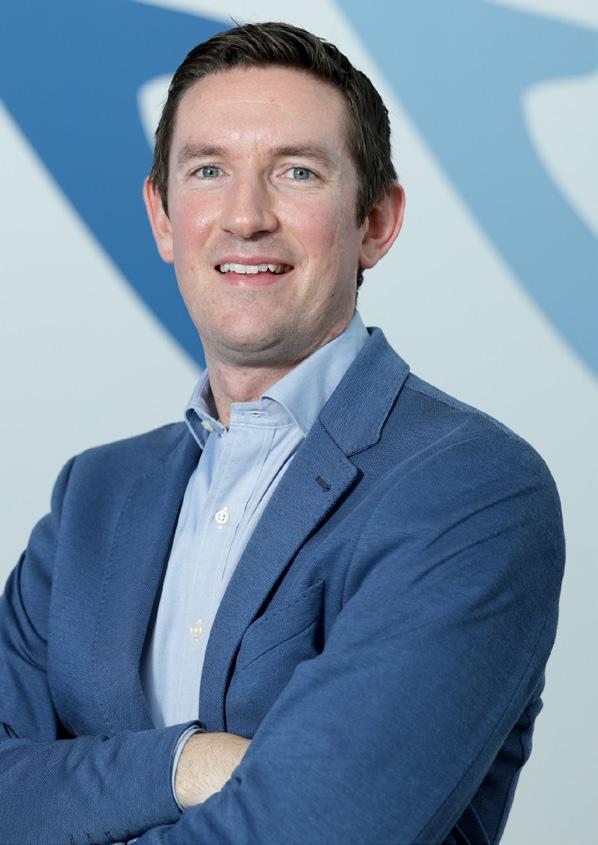
The Faculty of Dentistry was founded in 1963 with the core mission of advancing the science, art and practice of dentistry by promoting education, study and research. We have approximately 3,500 Fellows, Members, Diplomates and Affiliates globally.
The Faculty offers postgraduate general dentistry and specialist fellowships examinations and provides lecture-based and hands-on courses for dentists undertaking continuing professional development (CPD) and/or structured postgraduate training. The Faculty has longstanding specialist training collaborations with prestigious organisations overseas.
The Faculty faced COVID-19-related challenges with rigour, enthusiasm and proficiency.

The Faculty continued to flourish with hybrid office operations, in-house IT support and close teamwork strengthening our education offerings, fully utilising our in-house dental education expertise across national boundaries.
The Faculty expanded our virtual learning hub, bespoke examinations preparation, specialty training and CPD programmes. We customised our own asynchronous online learning platform, and became the first RCSI department to use a new electronic
interface to facilitate Fellows, Members, Diplomates and Affiliates to continuously subscribe to and engage with the Faculty. We are also integrating CPD activities, linked to our internationally recognised examinations portfolio, which are being offered online and in-person, as an integral component of a career pathway for dentists around the world.
The Faculty experienced strong demand for our quality assured, proctored examinations, with more than 2,000 candidates from five continents participating in the FFD, MGDS, MFD and DipPCD examinations in 20212022. We conferred more than 1,100 RCSI qualifications at the last two postgraduate conferrings.
The 2021 Annual Scientific Meeting, themed ‘Primary Care Dentistry from East to West’, attracted more than 1,000 participants across 14 timezones. We presented a refreshing online Faculty of Dentistry session at the 2022 RCSI Charter Meeting showcasing our pedagogic and scientific offerings. The feedback from both events was excellent.
The Faculty delivered the popular hands-on endodontics and clinical photography programmes at the state-of-the-art RCSI National Surgical and Clinical Skills Centre.
We resumed our flagship in-person CPD/MFD preparatory programme and the FFD specialist training programme in Paediatric Dentistry in Qatar in conjunction with Hamad Medical Corporation, attracting a record number of participants.
We take a proactive role offering collaborative solutions to enhance dental education and training, addressing the dental workforce shortages in Ireland, as part of RCSI initiatives.
As Dean, I am very grateful for the brilliant teamwork from the Faculty Board, the administrative team and colleagues from around the world. We are also extremely grateful for the great support from colleagues at RCSI.
Professor Albert Leung Dean, Faculty of Dentistry
The 2021 Annual Scientific Meeting, themed ‘Primary Care Dentistry from East to West’, attracted more than 1,000 participants across 14 timezones.

The Faculty of Radiologists continues to proactively adapt to change in the education and clinical arenas. Faculty Board members, Committee members, trainers, trainees and office staff have dealt with a vast range of issues over the past year on behalf of our specialties, in times of increasing concerns about the ability of our health services to cope with demand.
A few highlights are mentioned below:
• Annual Scientific Meeting (Sept 2021, virtual)
• Train the Trainers (October 2021, virtual)
• Irish MRI Meeting (January 2022, virtual)
• Combined Spring Meeting (April 2022, in-person)
• Radiology Quality Improvement Workshop (2022, virtual)
The Faculty has been successful in achieving accreditation by the Medical Council for our activities as a training body for our radiology training programme. The report for radiation oncology is awaited but preliminary signals are positive.
The Faculty also carried out successful training site accreditation visits to St Vincent’s University Hospital, Galway University Hospital, Cork University Hospital, Mercy University Hospital and Beaumont Hospital in the past 12 months.
The Faculty continues to attract high calibre candidates applying for training Specialist Registrar (SpR) posts.
The National Radiology Quality Improvement programme promotes learning in a safe environment for both trainee and consultant radiologists.
There were 71 applications for radiology and radiation oncology training programmes with 40 appointed to commence in July 2022.
The Faculty has driven a specialty recognition application for interventional radiology (IR) with the Medical Council. This is in acknowledgement of the growth and development of IR globally, and the expanding repertoire of IR minimally-invasive procedures. Following an initial common curriculum shared by all radiology trainees, IR trainees will require separate training pathways to promote the acquisition of their unique skillset.
The Faculty is strongly committed to lifelong professional learning. The National Radiology Quality Improvement programme falls within the remit of the Faculty and promotes learning in a safe environment for both trainee and consultant radiologists. It serves to reduce diagnostic error rates and enhance patient safety.
The Dean of the Faculty of Radiologists has a seat on the Specialty Training Board of the Royal College of Radiologists in the UK, a role which provides unique insights and opportunities for international benchmarking and the exchange of ideas on all matters related to postgraduate training of clinical radiologists.
As an outreach educational endeavour, the Faculty delivers a radiology training parallel programme in Kuwait.
The Faculty maintains strong links with the European Society of Radiology (ESR), the organisation dedicated to promoting and coordinating the scientific, philanthropic, intellectual and professional activities of radiology in all European countries. Dr Adrian Brady will be President of ESR from July 2022 to July 2023, a great honour for Irish medicine and the Faculty of Radiologists.
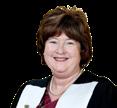
The RCSI Faculty of Nursing and Midwifery plays a pivotal role in the strategic development of the nursing and midwifery professions. The past year has been a challenging one for nurses and midwives and we are proud to continue to support them in innovative ways.
Delivering a transformative learning experience
The Faculty facilitated 37 Overseas Aptitude Tests (OAT) for 2,176 candidates from 46 countries wishing to practice as nurses in Ireland. The OAT contributes significantly to workforce planning in Ireland.
Faculty Fellowship and Membership continues to grow, with the conferring of 91 Fellows and eight Members in December.
Continuous Professional Development (CPD) is an important part of the Faculty’s work. More than 1,500 nurses and midwives engaged with Faculty programmes, webinars and events. Credentialing and revalidation programmes were completed by 56 healthcare industry representatives. The Psychiatric Nurses Association (PNA) College of CPD, in partnership with the Faculty, hosted seven programmes this year.
In terms of digital-enhanced pedagogy, the Faculty is building a proof-of-concept of the “FLO mCPD” platform. In parallel, a group comprising Fellows and Associates will oversee the digital content.
The Faculty won a significant e-tender commissioned by the Nursing and Midwifery Board of Ireland (NMBI) for a two-year project involving the assessment of internationally-educated nurses.
The Nursing Now (Nightingale) Challenge aims to enhance early career nurse and midwife leadership capacity. In 2021, 37 colleagues from the RCSI Hospitals Group participated, with a second cohort underway. The Faculty continues to recognise extraordinary compassion in care by sponsoring the RCSI Hospitals Group DAISY® Awards.
The Romanian Ministry of Health commissioned the Faculty to manage a two-year nurse leadership project. The first cohort, 45 senior nurses, attended RCSI to learn about Irish nursing and midwifery leadership.
A Memorandum of Understanding (MoU) was signed by the Faculty to deliver interdisciplinary education and training programmes in Malta.
In April, the Faculty celebrated 40 years of the Annual International Nursing and Midwifery Research and Education Conference. Recollections from past conferences, the conferring of three Honorary Fellows, the launch of five clinical bursaries, and the announcement of the artist commissioned to create an artwork to mark this milestone were included in the celebration.
The sixth Biennial Sigma European Regional Conference for Nurses and Midwives, ‘Sustainability in Partnership’, was co-hosted with the Faculty in June.
The Faculty completed two major projects this year on behalf of the Mental Health Commission:
• The National Quality Framework: Driving Excellence in Mental Health Services
• The evidence review to inform the review of the code of practice on the use of physical restraint and the rules governing seclusion and mechanical means of bodily restraint in inpatient mental health services
The European Centre of Excellence for Research in CPD is undertaking a cross-sectional study of newly-qualified nurses’ and midwives’ participation in CPD in four European countries; a Long-Term Care (LTC) research project evaluating the experiences of staff engagement with teaching modalities for CPD; and a systematic review on Evaluating the Continuing Professional Development Needs of the Older Person Care Workforce. The Centre is also coordinating an Erasmus+ proposal (Alliance for Innovation), involving 11 partners from six countries.
Professor Thomas Kearns and Professor Michael Shannon (Past Dean) have been appointed to the newly-launched WHO/Europe pan-European Mental Health Coalition.
The Faculty has appointed Professor Marie Carney as visiting professor to Nursing Homes Ireland.
In support of Ukrainian nurses, the Faculty, with NMBI, has scoped an orientation programme for nurses fleeing the war.
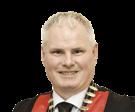
The Faculty continued to run CPD activities online through a variety of webinars and journal clubs, a spring symposium on ‘Shoulder & Elbow Injuries in Sport’ held in collaboration with UCC, and our first virtual Annual Scientific Conference (ASC) on ‘Exercise is Medicine’ in collaboration with UL. The ICGP/FSEM MSK Diploma returned in October 2021 having been postponed in 2020.
The HST SEM training programme is going from strength to strength with additional teaching sessions for trainees delivered by a cohort of FSEM Honorary Fellows, Fellows and guest lecturers. We introduced anatomy refresher sessions with the RCSI Department of Anatomy and Regenerative Medicine, and plan to develop simulation teaching sessions and introduce Human Factors sessions to cover non-clinical skills.
The Faculty underwent a re-accreditation process of our training programme with the Medical Council in December, with the draft recommendations report due later in 2022. We have engaged with other specialties to design a four-year route for SEM training in Ireland to align with EU Directive 2005/36/EC, which we hope will run alongside the current two-year route, and we have been working to secure additional training posts for this new and innovative programme. We are also conducting a review of the HST SEM curriculum against the UK curriculum and the EU standards for postgraduate training in SEM.
We were delighted to take part in RCSI Charter Week again this year, as part of the parallel sessions with the other postgraduate faculties. We will be giving a lecture to undergraduate medical students in RCSI as part of the new medical curriculum and look forward to further engagement with the undergraduate community.
We have conducted a review of the benefits currently on offer for Fellows and Members and the annual subscription fees, with a view to increasing benefits in the future. We are excited to announce that, as the Board recently approved the opening of the Faculty to colleagues working in the fields of physiotherapy, athletic therapy, and exercise sciences, we are about to become a multi-disciplinary Faculty. Further details about this major development will be announced later in 2022.
The Faculty underwent a re-accreditation process of our training programme with the Medical Council in December.
It has been another challenging year for the Board, Committees and staff of the Faculty of Sports and Exercise Medicine (FSEM).
Dr Philip Carolan Dean, Faculty of Sports and Exercise Medicine (RCPI and RCSI)Professionaltraining
RCSI is the managing body for the Irish Institute of Pharmacy (IIOP), as appointed by the Pharmaceutical Society of Ireland (PSI). The IIOP manages the statutory
Continuing Professional Development (CPD) system for pharmacists in Ireland and supports the development of pharmacy practice.
The aim of ePortfolio Review is to allow pharmacists to demonstrate their ongoing engagement with Continued Professional Development (CPD), in line with legislative requirements.
The 2021/22 ePortfolio Review included 965 pharmacists, with more than 94% receiving an outcome of Standard Met. The high level of engagement with ePortfolio Review, along with the number of Standard Met outcomes, is evidence of pharmacists’ commitment to CPD.
The IIOP continued to support pharmacy practice through a range of training programmes and resources, including 23 accredited online training programmes.
The following online training programmes and resources were launched in December 2021:
• Clozapine: A Clinical Overview
• Lithium: A Clinical Overview
• Medication Without Harm
• Antimicrobial Stewardship for Community Pharmacists

Following the success of the pilot programme, we launched our first broader Mentoring Programme
for pharmacists in September 2021. Applications were invited from pharmacists from all sectors and career stages and the response exceeded places available. A second programme was launched in May 2022.
The IIOP Mentoring Programme was recognised by the European Mentoring and Coaching Council (EMCC) with the EMCC Global Mentoring Award 2021. The Programme was also a finalist for the Irish Institute of Training & Development (IITD) Award for Best Coaching or Mentoring Initiative.
In late 2021, eight sessions of the Effective Representation programme were delivered to two groups of pharmacists, with each group attending four sessions. The objective of the programme is to support pharmacists in effectively representing the professional pharmacy agenda within committees. Another four sessions were delivered to a third group in 2022 with an in-person event in April for all three groups.
The ‘In Conversation With…’ webinar series, resumed in September 2021 with a ‘Mentoring in Practice’ webinar. The series ran until June 2022 with a total of 18 webinars delivered.
The 2021 annual Peer Support Pharmacist training event was held virtually for the second year in a row. A 90-minute interactive webinar on the topic of networking was delivered to 40 pharmacists.
Between October 2021 and March 2022, eight Managing Conflict in Pharmacy Practice live online workshops were delivered to 76 pharmacists.
Pharmacists who completed the Effective Representation training programme attended an event in April 2022 in Dublin, the first in-person event hosted by the IIOP since 2019.
The IIOP was honoured to take part in RCSI Charter Week in April 2022 with the session, ‘Supporting and Facilitating Professional Development for Pharmacists during the COVID-19 Pandemic’.
Dr Catriona Bradley Executive Director, Irish Institute of Pharmacy
The high level of engagement with ePortfolio Review, along with the number of Standard Met outcomes, is evidence of pharmacists’ commitment to CPD.
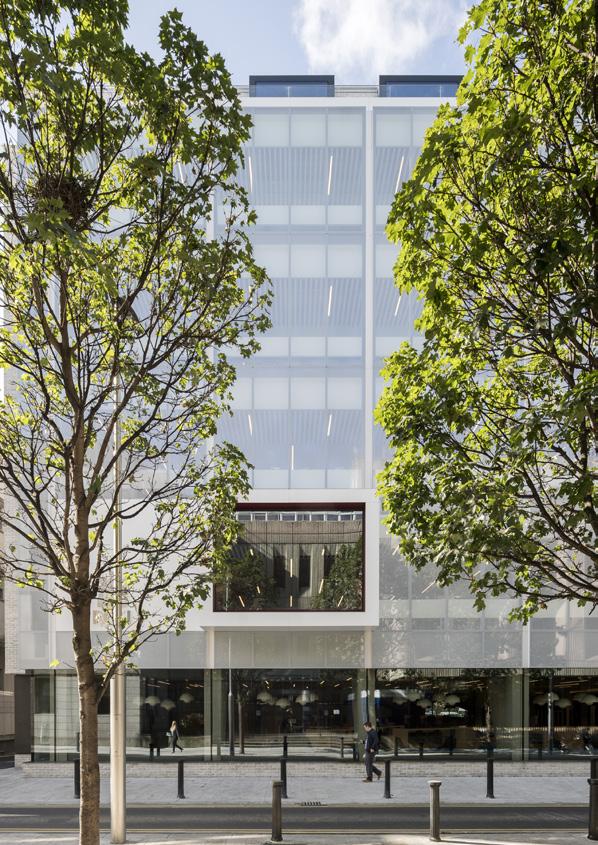
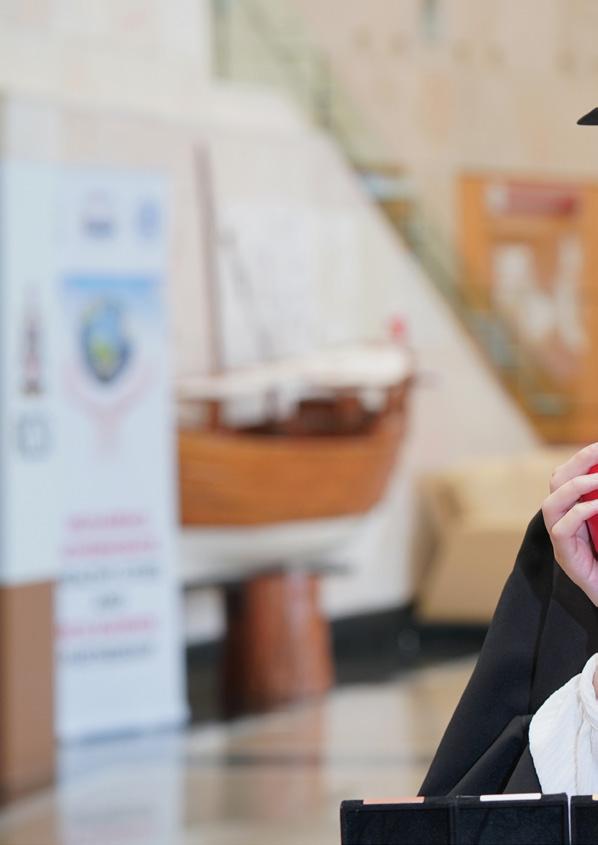
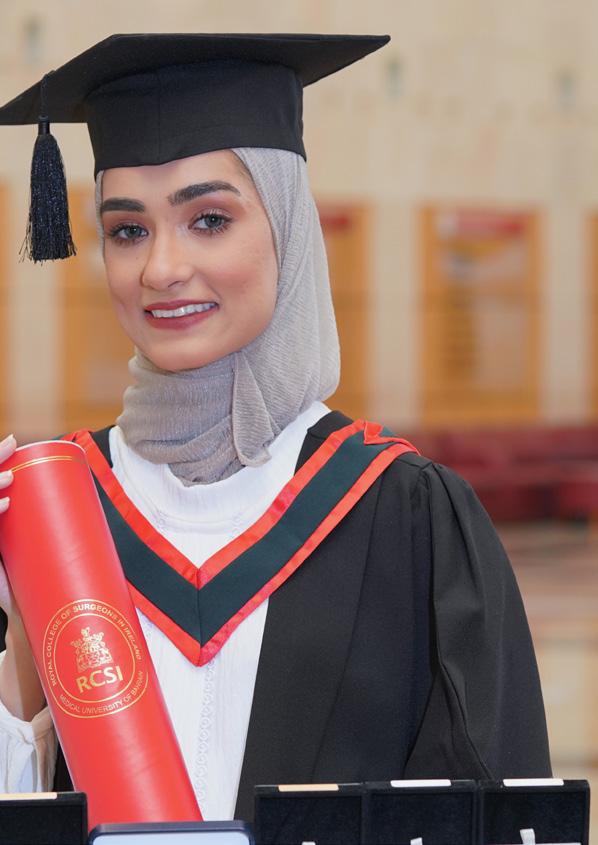
The international reach of RCSI’s education and research missions is epitomised by our campuses in Bahrain and Malaysia. Despite the ongoing challenges as we emerge from the pandemic, our academic and professional staff continued to drive innovation in international medicine and health sciences education and research during the past 12 months.
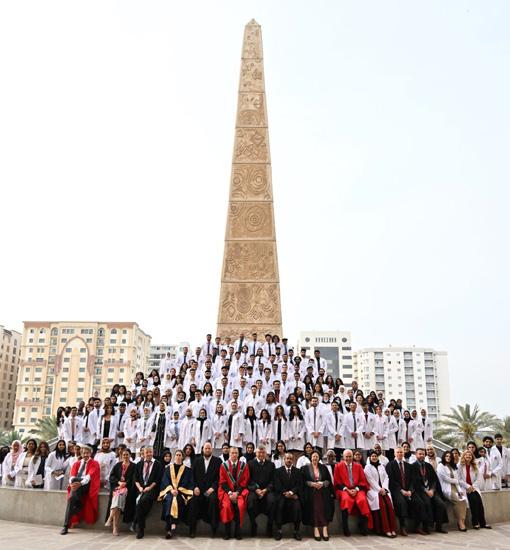
With a student body numbering more than 1,300 and with 2,600 alumni working in 30 countries across the world, RCSI Bahrain nurtures outstanding healthcare professionals who are committed to advancing human health worldwide. Our emphasis on clinical competence, community health and translational research focused on national, regional and global healthcare priorities, is key to our academic excellence.
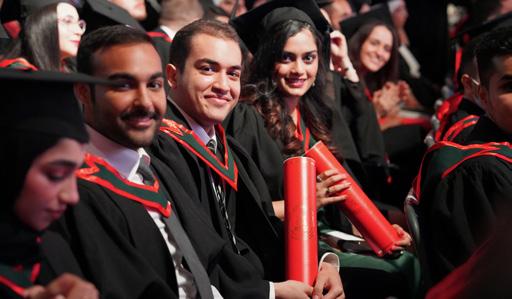
This year, RCSI Bahrain received the decision of Full Confidence from the Bahrain Education & Training Quality Authority (BQA) for the re-validation of its undergraduate nursing and MSc in nursing
programmes. RCSI Bahrain continues to maintain its valid status, as placed on National Qualifications Framework of Bahrain (NQF), for its undergraduate Nursing and MSc in Nursing programmes.
RCSI Bahrain celebrated the launch of the Solar Farm project, making it one of the first universities in Bahrain to utilise solar power. With its estimated completion by January 2023, the solar farm will cover 12,000sq m with 4,854 solar panels and produce an expected yearly energy production of 3.54MWh, equivalent to 55% of RCSI Bahrain’s current energy consumption. This project contributes to an annual saving of 2,247 metric tonnes of carbon dioxide (CO2) per year. Additionally, the solar panels will be placed on structures over the current car parks, therefore providing 880 shaded parking slots.
This launch marked the start of our RCSI Bahrain’s Green Campus initiative to enhance campus sustainability and promote environmentally-conscious practices. Green Campus comprises the reduction of power consumption and single-use plastics, the paperless office and increased tree planting. Students enthusiastically welcomed the initiative.
To celebrate International Nurses Day 2022, the School of Nursing and Midwifery participated in a two-day virtual conference. With the theme ‘Nurses: A Voice to Lead - Invest in Nursing and Respect Rights to Secure Global Health’, it brought together nursing
This project contributes to an annual saving of 2,247 metric tonnes of carbon dioxide (CO2) per year.Internationalcampuses RCSI Bahrain School of Medicine Conferring in June
faculty and students from Keele University, UK; Edith Cowan University, Australia; Catholic University of Applied Sciences, Germany; General Sir Kotelawala Defence University, Sri Lanka; The Chinese University of Hong Kong and RCSI Bahrain. RCSI Bahrain nursing faculty and alumni shared their experiences of nursing education and highlighted the contributions made by students and staff to healthcare during the COVID-19 pandemic.
A group of senior medical students from RCSI Bahrain were awarded first prize for their systematic review, under the supervision of Professor Ghufran Jassim, Head of Family Medicine Department, of the effects of COVID-19 on the nervous system, at the International Federation of Medical Students’ Associations (IFMSA) Eastern Mediterranean region (EMR) conference in
Tunisia, in January 2022. The IFMSA is one of the largest student-run organisations, connecting medical students from around the world.
RCSI Bahrain congratulated Salam Wael Elakkawi (MED2) who received second place for her research project entitled ‘Recurrent Bacterial Vaginosis: Emerging Anti-Biofilm Therapies in 2020’ and Alekya Anala (MED1), Prianna Menezes (MED3) and Jayaditya Devpal Patil (SC2), who were awarded fourth place for their project entitled ‘Challenges of diagnosing Placenta Accreta; Can MRI help in Management?’, under the supervision of RCSI Bahrain alumna Dr Bedoor Alomran, Chief of Radiology at the Bahrain Defence Force Hospital.
National campaign on colorectal cancer Medical and Nursing students and alumni volunteered in a three-day national campaign for colorectal cancer awareness and Screening, held in a major mall in Bahrain, to inform the general public of the importance of colorectal cancer screening and to create awareness of the importance of early detection for a good prognosis.
This year, RCSI Bahrain celebrated a record number of students and alumni who matched into US and Canadian residency programmes for 2023 with 36 matched in the US, six in Canada, as well as the UK Foundation Programme in August 2022, with 96 matched into Foundation Year 1 and 15 into Foundation Year 2 and Core Training positions.
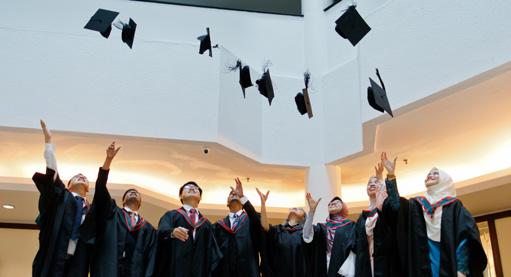
We deliver graduate training to family doctors in Malaysia in cooperation with Irish partners including RCSI and ICGP.Medical graduates celebrate at the RUMC conferring ceremony in June, the first in-person ceremony to be held in three years .
This year we experienced a relaxation of COVID-19 restrictions in Malaysia and it has been a pleasure to welcome students back to campus. The resumption of face-to-face teaching has been a positive and energising experience for faculty and students alike. Enrolments have increased this year and mark a welcome rebound from the challenging recruitment environment of the last few years.
RUMC has appointed its first full-time Librarian. Evelyne Anand was previously Librarian at RCSI in Bahrain, and is a welcome addition to our team. We look forward to enhancing our information provision and providing best-practice services to students and faculty. Professor Simon Jones took up the post of Vice President and Registrar in January of this year.
Our first in-person graduation ceremony for three years was held in June. We invited all students who had not previously had an in-person graduation to attend. More than 150 students were attended a much-appreciated ceremony. It was a pleasure to have colleagues from RCSI, UCD, and the National University of Ireland come together to recognise and celebrate this important event.
MInTFM (Malaysia-Ireland Training Programme for Family Medicine) is a ground-breaking initiative whereby we deliver graduate training to family doctors in Malaysia in cooperation with Irish partners including RCSI and ICGP. The Programme is of four years duration, with one day per week of direct instruction delivered by RUMC. The Programme is led by Clinical Director Dr Cathy Cullen, an experienced Irish GP.
Currently, there are 300 trainees in MInTFM, and we deliver training across the all mainland Malaysia. Graduates of the Programme are then eligible to join the National Specialist Register as specialists in Family Medicine.
RUMC is Malaysia's Associate Cochrane Centre. It collaborates with four other Malaysian healthcare
organisations to deliver Cochrane studies. Most recently, our own Professor Siew Cheng Foong, an Associate Professor of Paediatrics at RUMC, was awarded the Kenneth Warren Prize for the Best Cochrane Review of a health issue in a low or middleincome country. We are delighted for her to receive this international recognition.
PU-RCSI School of Medicine is a collaboration between RCSI and Perdana University. Through this partnership, the RCSI five-year undergraduate medicine programme is delivered in Malaysia. The programme is currently in a teach-out phase with three remaining cohorts to graduate in 2022, 2023 and 2024.
For the academic year 2021-2022, the programme was modified to allow students to progress despite restrictions due to the COVID-19 pandemic. The Senior Cycle (SC) 2 class recently completed their final exams in-person at Hospital Tuanku Ja'afar Seremban and will graduate in November 2022. In June 2022, a full accreditation was carried out by the Malaysia Medical Council.
Despite restrictions, the PU-RCSI students have been very active with Malaysian Medics International as well as the Asian Medical Students' Association Malaysia and International and have led initiatives on flood relief locally. In late 2021, final year student Afiq Imran bin Masron won the IMU art competition with a piece about resilience and the frontline experience of healthcare workers.
School staff achieved more than 30 peer-reviewed publications and secured research funding from a number of sources. Staff continued to contribute to the University’s regular ‘Health with Perdana’ public educational articles in The Star national newspaper’s health supplement. In early 2022, Dr Christina Liew was one of 20 from over 2,000 applications in 2022 in the International Foundation for Advancement of International Medical Education and Research (FAIMER) fellowship.
For the academic year 2021-2022, the programme was modified to allow students to progress despite restrictions due to the COVID-19 pandemic.Internationalcampuses
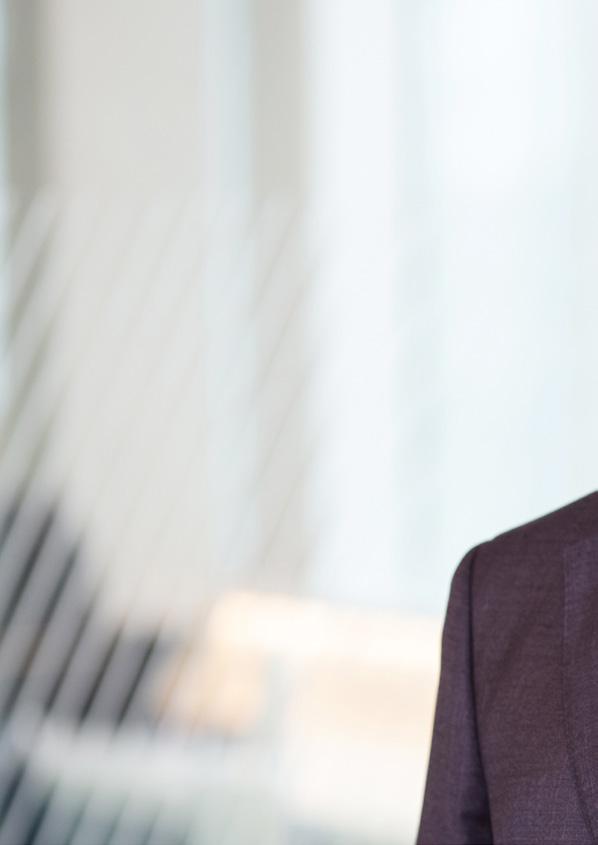
By ensuring that our future healthcare leaders are culturally competent, socially conscious and have a sense of civic responsibility, we hope to contribute to a more inclusive and fair society.
EmekaOkereke, ChairoftheRCSIRaceEqualityForum
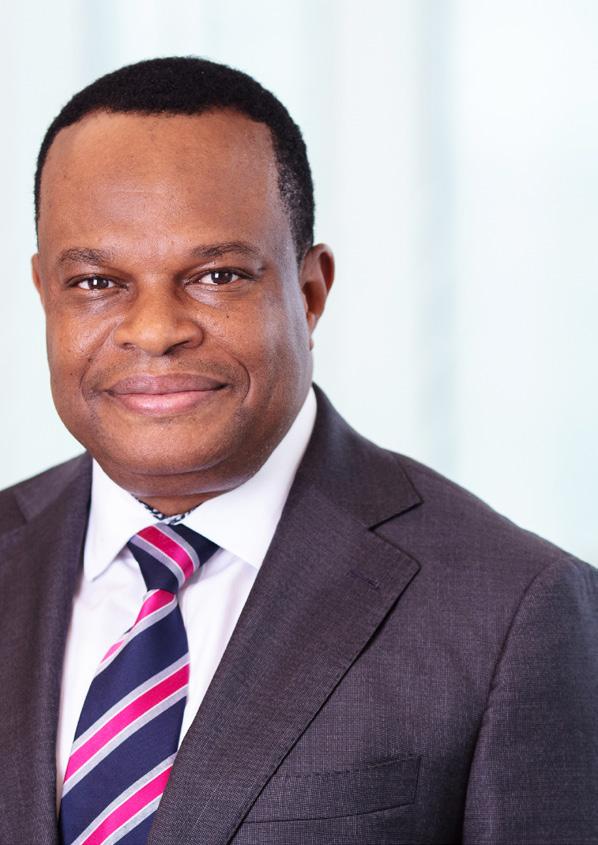
Amidst a challenging time for healthcare professionals, we focused on supporting programmes that are of key importance to students, faculty, alumni, fellows, members and donors. Our community has responded with enthusiasm to get involved, and to support and re-connect with RCSI more than ever before.
RCSI’s fundraising initiative, RCSI Tomorrow, is focused on achieving long-lasting impact on global health via strategic education and research. Since the initiative launched in 2016, €30 million has been raised, with a number of the largest gifts in RCSI’s history secured. Projects are categorised into four pillars:
• Creating healthcare leaders of tomorrow: Funds raised unlock opportunities for future leaders. This year, a record number of alumni supported student scholarships including Aim High, Consilio Manuque, Kiran Pathak, International Medicine and sports scholarships. In addition, support was received for clinical electives, Research Summer School, PROGRESS Women in Surgery Fellowship and StAR MD.
• Building healthier societies: With the aim of advancing public health, RCSI stewarded philanthropic support for the work of three professorial positions – Chair of Simulation Education & Research, Chair of Medical Professionalism, O’Brien Chair of Global Surgery – and the rapid expansion of faculty for the RCSI Centre for Positive Psychology and Health.
• Advancing breakthrough research: In 2021, RCSI researchers continued to publish outstanding papers and increase impact for patients through important research collaborations such as the SCRUm Study with the IRFU Charitable Trust, and the 3M partnership on advancing understanding of the impact of COVID-19.
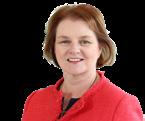
• Forging the RCSI Med Quarter: At the centre of the ‘RCSI Medical Quarter’ is 26 York Street. The contribution of our alumni donors is woven into the fabric of this facility as all rooms are now named in recognition of alumni leaders as a celebration of their contribution to medicine.
More than 1,000 individuals, companies and foundations have donated to the RCSI Tomorrow
Our role as the Development, Alumni Relations, Fellows and Members Department is to provide meaningful engagement to the RCSI community.
Aíne Gibbons Director of Development, Alumni Relations, Fellows and Members
The festive video greeting to alumni received a silver award as part of the international CASE Circle of Excellence Awards programme.
campaign. We are deeply grateful to all who, through their philanthropic support, enable RCSI’s ambition.
It has been a time of renewal as our 28,000-strong alumni community learned to connect, socialise and work in a new type of normal.
Motivating alumni to engage with RCSI in a virtual space, the second virtual Alumni Gathering, held in August 2021, featured 13 online events, eight class video calls and two virtual café sessions, to help maintain strong connections.
Bringing a smile to the faces of our alumni community and inspiring fond memories of the excitement of the holiday season in Dublin, the Alumni Relations Team held a ‘casting call’ for the Season’s Greetings video featuring alumni as the stars of the show. The festive video greeting to alumni received a silver award as part of the international CASE Circle of Excellence Awards programme.
In-person conferrings allowed the team to connect directly with the graduating Class of 2022 and forge important new relationships. Alumni events made a welcome return when Dr Karen Flood (Class of 2001) joined Professor Caroline de Costa and Dr Denise Curtin (Class of 1973) for a lively discussion to mark the publication of Professor de Costa’s memoir.
The weekly alumni eNews continued to resonate with readers with series like ‘Love Stories of RCSI’ cementing the many ties connecting RCSI alumni
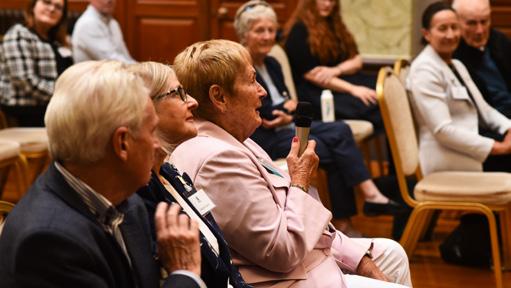
to their alma mater. Print copies of the ever-popular Alumni Magazine were delivered to alumni in 98 countries. Among the stories covered were accounts of the career paths of alumni 10, 20 and 30 years since graduation, and the big reveal of RCSI’s ambitious plans for 118 St Stephen’s Green.
The Fellows and Members community is growing and includes more than 10,000 surgeons in 87 countries. Between July 2021 and June 2022, 285 Fellows and Members were formally admitted and welcomed to RCSI. A further 175 new Affiliate Members joined our community. By targeting learning resources specifically to the MRCSI examination candidates, RCSI is doing its utmost to support the future talent pipeline.
To maintain strong ties and share timely information with RCSI as the professional body for surgery, the Fellows and Members office maximised its digital storytelling skills, delivering 10 editions of the online Surgical Bulletin and two print and digital issues of Surgeons Scope magazine, each sharing the stories of inspirational surgeons and role models, among them Professor Tariq Saeed (working in Bahrain) and Ms Tafadzwa Mandiwanza (working in Dublin).
We look forward to continuing to support the vision of our President and Council to open up new opportunities by bringing together surgeons from around the world, united in the task of reestablishing safe, timely and equitable access to elective surgery.

The next phase of RCSI’s campus development in Dublin city centre is underway. Bennett Construction Ltd were appointed by Council as the construction contractor in March 2022 and demolition/enabling works commenced on site in May.
The €95 million expansion project at 118 St Stephen's Green, also known as Project Connect, will enrich the student experience and provide vital infrastructure for pioneering health sciences research and innovation, as well as creating a space for local community engagement.
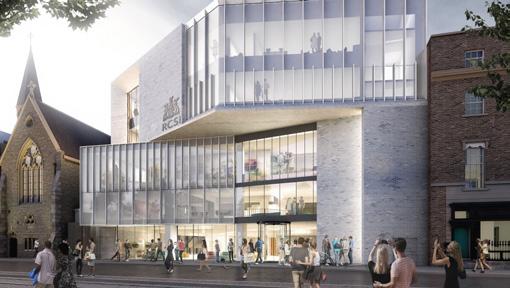
A key design element of Project Connect is its physical link to RCSI’s presence at 26 York Street, significantly opening up RCSI’s education space for the 3,000 students and staff who visit the campus daily for study, work and extracurricular activities. The development will be home to the new RCSI School of Population Health, the RCSI Graduate School of Healthcare Management, and a 50sqm virtual reality surgical training space for the National Surgical Training Centre. It will allow for the introduction of new concepts such as learning communities and provide small group
teaching spaces and flexible flat floor teaching spaces. Another key purpose of the project is to enhance RCSI’s research and innovation activities, providing up to three floors of state-of-the-art laboratory, write-up and support facilities for existing and new research programmes and initiatives. The development will renew RCSI’s historic connection with St Stephen’s Green by becoming the new “front door” of the campus. It will include a new civic engagement space for public events and exhibitions, aligning with RCSI’s goal of enabling people to live long and healthy lives.
The launch of Project Connect in May 2022 was attended by Minister for Further and Higher Education, Research, Innovation and Science, Mr Simon Harris TD, who unveiled hoarding that will be in place until the project’s scheduled completion in 2025.
RCSI’s ambition to deliver a transformative education and learning experience for students is the driver for investment in digital projects across assessment, feedback and clinical placements.
New clinical placement and real-time assessment tools will transform how clinicians, students and staff experience life in the healthcare education setting, providing a leap in capability and ease of use for our clinicians, students and staff.
The Information Technology (IT) department strives to continually improve RCSI’s organisational effectiveness through digital transformation, automation and IT service improvement activities. As part of this work, a new integration hub has been developed which enables RCSI applications to connect with one another. An example of efficiencies achieved through this programme is a reduction in operational processes required to set students up on RCSI’s virtual learning platform. This new hub will enable delivery of similar efficiencies in the near future.
IT organisational improvements were also achieved through the implementation of an online IT Support Portal, streamlining of IT procurement processes, and a complete system access management process redesign in conjunction with HR.
A new CRM system has enhanced our student recruitment and marketing functions, enabling RCSI to strengthen national and international collaborations. Work will continue on this system to develop engagement with RCSI Fellows, Members and Alumni. The rollout of MS Teams/SharePoint collaboration spaces and OneDrive continues across RCSI. This provides a host of transformational benefits to all RCSI staff.
A key IT investment has been made in building an IT team to deliver high quality digital-first content in a scalable fashion. This past year, four new online programmes were developed and delivered with Graduate School of Healthcare Management (GSM) and the School of Nursing & Midwifery: Leading Digital Health Transformation, Wound Management and Tissue Viability, Healthcare Management, and Advanced Leadership (Nursing). A number of programmes are currently in development such as AI and Radiology; Cyber Security in Healthcare; The Internet of Things and Digital Healthcare; and Citizen Centricity, to name just a few.
IT security is embedded within the management of applications and infrastructure, with planned cycles of cyber security reviews and action planning on a continuous basis. We recognise the importance of user education for IT security literacy and rolled out new IT security awareness training in conjunction with HR. This training complements the extensive workshops, training and support guides that IT delivers to upskill students and staff on all aspects of IT. To ensure staff and students are getting the benefits of new and improved system features, and to ensure RCSI IT systems and infrastructure are supported and secure, IT continues to maintain and upgrade RCSI applications and infrastructure.
RCSI IT continues to prioritise the current and future needs of our students, staff, researchers and other key stakeholders.

IT security is embedded within the management of applications and infrastructure, with planned cycles of cyber security reviews.
RCSI is committed to embedding equality, diversity and inclusion (EDI) across everything we do. This ensures we can all work and learn in an environment defined by dignity and respect.

Perimenopause and Menopause’ in collaboration with the RCSI MyHealth Committee. We launched the second edition of our Positive Ageing booklet and hosted a staff barbecue to celebrate Pride week with RCSI’s Sports and Social Club. To mark International Women’s Day, we worked with Dr Gozie Offiah (School of Medicine), and Professor Christian van Nieuwerburgh (Centre for Positive Psychology and Health) on an event to raise awareness of bias, stereotypes and discrimination and how we can all play an active role to #BreakTheBias.
This year, our three student and staff forums and six staff networks engaged on a regular basis.
The RCSI Race Equality Forum led the development of a comprehensive action plan. The plan demonstrates our commitment to advancing race equality for our students, staff and the wider community. In November 2021, RCSI became the first Higher Education Institution (HEI) in Ireland to launch a Race Equality Action Plan while publicly announcing its commitment to advancing racial equality at RCSI: “We acknowledge that racism, systemic inequality, and discrimination exists in our society. We reject racial discrimination in all its forms as wrong and fundamentally inconsistent with our mission and values”.
Our Women’s Network hosted two public online events ‘Discover Research Stories’ and ‘Living Well Through
In October 2021, RCSI joined 18 Irish HEIs in launching SpeakOut, an anonymous reporting tool aimed at creating safe campus communities. This tool (available at rcsi.speakout.ie) facilitates policy implementation and signposts staff and students to support services.
We collaborated with our student community to support our understanding of the different challenges they face while studying. We are grateful to those student advocates and champions who contribute to the EDI Forums, attend our events and training, and generously share their knowledge and expertise with us. This year, our Student Engagement and Partnership (StEP) project, with medical student Sarah Ghobrial, focused on disability inclusion in our curriculum.
We continue our work advancing gender equality with two schools submitting a Bronze Departmental Athena Swan application this year. The Athena Swan Working Group is also working towards renewing RCSI’s Bronze Award in April 2023. In partnership with RCSI Simulation Team, UCC and TU Dublin, we worked on, LIBRA, a HEA-funded research project, to develop a simulation-based training programme in gender equality and leadership.
We continued to deliver a suite of EDI training for students and staff covering various equality grounds. Almost 400 students and staff attended training on topics including Race Equality, Autism Awareness, Trans101 and Awareness & Disclosure training. Many thanks to our partners including: AsIAm, Dublin Rape Crisis Centre, Enable Ireland and the Transgender Equality network Ireland (TENI).
RCSI became the first Higher Education Institution (HEI) in Ireland to launch a Race Equality Action Plan.

International engagement and external relations are core components of our strategy for education and research excellence and are central to building the University’s international profile and reputation.
Internationalisation activity happens on many levels across RCSI - through our branch campuses, international students and faculty, staff and student mobility initiatives, international events, collaborations, alliances and partnerships.
Our focus is also on internationalisation of the curriculum, summer schools, global citizenship and cultural diversity. Most of these activities are managed in a decentralised way, with no single office or function responsible for international affairs. The International Engagement Steering Group was established to coordinate and plan our activities and in the year the Steering Group published an Action Plan and International Engagement Framework to support every part of the University to “be international”.
One of RCSI’s core values is collaboration – the ability to come together in equal partnership to enhance education and health outcomes to help people to live long and healthy lives.
During the year, we saw several partnerships develop and grow with prestigious universities world-wide. Among them is a partnership with Sorbonne University Medical School in Paris where Erasmus student exchange agreements have led to reciprocal visits to discuss research and staff mobility collaborations. Through our relationship with Milan’s Humanitas University and reciprocal visits in the year, we joined with the medical schools of Wraclow University in Poland and the Medical University of Vienna to bid to become Associate Partners in the European University Alliance for Global Health (EUGLOH). A decision on acceptance to this important consortium is expected from the European Commission in the next academic year.
To build our relationships with other international universities and individual academics, we produced orientation guides that set out the supports available to them should they want to visit, exchange or collaborate with RCSI. This was supplemented with an interactive map on our website detailing RCSI’s global connections to help potential partners identify areas of possible alignment and common research or scholarly interests.
In 2021, we launched our Collaborate initiative to provide funding and support to encourage RCSI academics to host international events in Dublin and also to bid to bring major academic conferences to the city. The initiative supported 12 high-profile events in 2021-22.
Our focus on international engagement resulted in RCSI being ranked in the world’s Top 50 for International Outlook in the Times Higher Education (THE) World University Rankings 2022.
International engagement is central to the RCSI strategy for education and research excellence and our impact on society.
Abi Kelly Director of International Engagement and External Relations
One of RCSI’s core values is collaboration – the ability to come together in equal partnership to enhance education and health outcomes.

Understanding and responding to new ways of working enables us to create the best possible environment for our workforce. The Human resources (HR) team’s priority is to support and engage staff, enhance leadership and management capability, support organisational development and promote a positive work environment and culture.
As COVID-19- related restrictions were lifted over the last year, a key focus for the HR team has been to support colleagues as we navigate the changing world of work.
We are currently in a period of trial and experimentation with hybrid working patterns across the organisation and HR has been working closely with people leaders and colleagues to support them in these new ways of working.
This year, HR facilitated two Senior Leader Group sessions on this important topic to disseminate key messages and solicit views and inputs. A Hybrid Leaders’ Toolkit, including conversation guides and a team agreement framework, has helped managers and teams to co-determine ‘when, where and how we do our best work’.
We continue to closely monitor staff sentiment, experience and wellbeing through quarterly Pulse surveys and live engagement sessions, recently held both in-person and online. 91% recommend RCSI as a good place to work, 89% feel proud to work for
RCSI and self-reported wellbeing among staff has been climbing steadily over the last year up from an average of 6.76 in June 2021 to 7.36 in June 2022. Our commitment to wellbeing was recognised by IBEC who, following an evidence-based assessment process, re-accredited RCSI with the ‘KeepWell Mark’, which recognises companies who excel in workplace wellbeing.
Thirteen academic, research and professional support colleagues participated in the Aurora Women’s Leadership Development programme this year, while 10 more benefited from generous funding support through the Staff Development Scheme to complete professional diplomas, masters and doctorates. Our in-house programme of short courses had over 1,100 participant days and for the first time, our annual required training campaign saw 100% completions across four courses, including a new topic of Cybersecurity Awareness.
We have been encouraging and facilitating mentoring opportunities for staff across the University and this year saw the introduction of the ‘Positive Connections’ early career academic mentoring programme and the ‘Collaborate’ inter-institution mentoring programme for professional services managers, which add to a range of other mentoring opportunities offered.
HR partnered with the Department of Surgery to trial a Career Development Programme for our surgical clinical educators. The programme included a variety of career supports including clinician mentoring, CV clinics, mock interviews and career talks. This programme will be expanded in the coming year so that all clinical educators can avail of these additional career supports.
Personal Development Plan (PDP) completion rates remained high at over 90% and this year we continue to evolve this important process to focus on performanceenhancing conversations rather than ratings. Our recruitment team continues to support hiring across the organisation with 290 new employees recruited over the last year.
91% recommend RCSI as a good place to work, 89% feel proud to work for RCSI and self-reported wellbeing among staff has been climbing steadily over the last year.

RCSI is an independent, not-for-profit, health sciences institution. RCSI operates under Royal Charter given by King George III in 1784 to the College for the governance of surgical training in Ireland. Since its foundation, RCSI has remained dedicated to its core mission of educating and training doctors and other healthcare professionals.
Over time RCSI’s activities have been extended to include medical and healthcare education through undergraduate and postgraduate courses, research programmes and various community outreach activities. In December 2019, RCSI was granted university status as RCSI University of Medicine and Health Sciences, having received designation as a statutory degree-awarding body in 2010. RCSI is also a recognised college of the National University of Ireland (NUI). Educational programmes at RCSI are accredited by various bodies including Quality and Qualifications Ireland (QQI) and the Irish Medical Council (IMC).
RCSI is ranked in the top 250 universities in the Times Higher Education (THE) World University Rankings and in the top 50 universities for United Nations Sustainable Development Goal 3 “Good Health & Well-Being” in the Times Higher Education Impact Rankings.
As a registered charity, RCSI endeavours to further its education and research objectives through various activities in line with the mission “to educate, nurture and discover for the benefit of human health”. These activities encompass the three strategic pillars of education, research and society. RCSI’s education, training and research activities span three continents, Europe, Asia/Middle East, and Africa from its Irish headquarters. RCSI operates three medical schools overseas, one in Bahrain and two in Malaysia (Perdana and Penang), and a range of healthcare management courses.
Postgraduate professional training programmes extend beyond those run in Ireland, with close links and common training curricula with sister Royal Surgical Colleges in England and Scotland and supporting the College of Surgeons East, Central and Southern Africa (COSECSA) in cooperation with Irish Aid. The RCSI faculties of Radiologists, Dentistry, Nursing and Midwifery, and Sports and Exercise Medicine provide oversight, education, and
examination in their respective disciplines. The Irish Institute of Pharmacy provides continuing professional development for pharmacists throughout Ireland.
Partnership is a key tenet of RCSI’s delivery model, encompassing collaboration with other Higher Education Institutions (HEI) through research studies, outreach programmes with local communities, and clinical placements including the academic partnership with the RCSI Hospitals Group.
As one of Ireland’s largest indigenous services exporters, RCSI makes a significant contribution annually to the Irish economy. RCSI employs more than 1,300 people in Ireland and it is estimated that approximately 2,000 additional indirect jobs across the Irish economy are supported through the expenditure of our staff and students.
As the governing body of the institution, the RCSI Council has responsibility for financial affairs, with certain functions delegated to the Finance and Audit and Risk Committees. A key objective is to ensure robust financial stewardship, including compliance
with the Charities Governance Code and bank covenants. The College is committed to progressing Sustainable Development Goals (SDG) and is a signatory of the Principles for Responsible Investment, as supported by the United Nations.
RCSI’s operating model is primarily self-funding with a small percentage of revenue derived from public sources. In line with RCSI’s charitable remit, all surpluses earned are re-invested for the furtherance of the University’s education and research goals.
There is a strong focus on the generation of an annual cash surplus to enable the organisation meet its commitments as they fall due. These commitments are both current and capital in nature and include funding day-to-day operations, working capital needs, servicing debt and campus infrastructure investments. Significant capital expenditure projects are funded through an appropriate balance of debt and cash reserves. A level of reserves is maintained to provide for strategic investment, including market offerings, and to enable responsiveness to general market volatility.
Overall, despite operating in a global pandemic, RCSI delivered a solid financial performance for the 12 months ending 30 September 2021 in line with approved plans and bank covenant requirements.
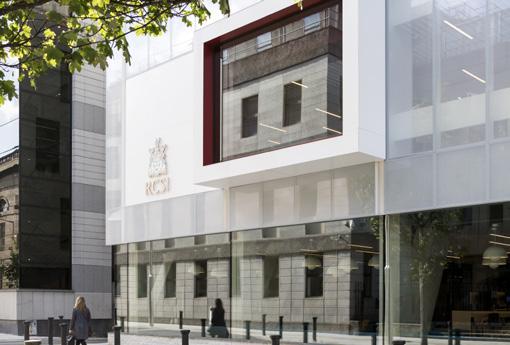
The majority of revenue continues to be generated from those activities that are core to RCSI’s mission.
Education and training programmes
funded research
These include degree-awarding activities, professional postgraduate training, and research programmes. In addition, a valuable source of ancillary revenue is derived from an investment portfolio. Public funding sources account for 14% of total revenue.
Group revenues grew by 5% on 2019/20 levels, primarily due to strong growth in education programmes and increased research activity. Numbers of undergraduate and postgraduate students and professional trainees stand at more than 5,000, with
representation from more than 80 countries. More than half of all students attending RCSI do so under a sponsorship agreement or other supports.
Operating costs, including depreciation and interest, increased by 10% year-on-year. Significant investment was made as a direct response to COVID-19 to ensure the safety of our students and staff, for successful delivery of the 2020/21 academic year. Despite the challenges faced, RCSI looked to its post-pandemic future, continuing the rollout of a number of key strategic investments, while briefly pausing major capital campus projects. As is typical in higher education institutions, staff-related costs account for the majority of the operating expenditure. Costs continue to be closely monitored to ensure effective use of resources, with a focus on continual improvement, and a sustainable environment.
Unrealised non-operating net gains on year-end re-measurements recognised in the Consolidated Statement of Income and Expenditure include currency impacts and investment property/pension scheme revaluations, amounted to €8 million. The defined benefit pension scheme deficit stood at €9 million as measured under accounting standards, while the funding plan agreed with the Irish Pensions Board following a 2012 restructure, remains broadly on track.
Net operating cash equivalent to 6% of revenue was generated in the year having met commitments relating to debt servicing, capital expenditure plans and working capital movements. Robust management of cash reserves continued including the minimisation of the effects of a negative interest environment.
Overall, RCSI’s net asset value increased by 5% arising from a strong financial performance and an improved pension deficit valuation. Campus capital investments amounted to €7 million focused on the digital transformation and campus infrastructure improvements programmes.
Consolidated balance sheet
Non-current assets
Current assets
Total assets
Current liabilities
Non-current liabilities
liabilities
assets
RCSI has a number of investments through subsidiary structures in support of its mission. In Ireland these include a property management services company (West Green Management Company Ltd) and a travel company (RCSI Travel DAC) to support the delivery of programmes overseas. RCSI operates a medical university in Bahrain, and a joint venture with University College Dublin in Malaysia (RCSI-UCD Malaysia Campus, formerly known as Penang Medical College).
Overall, despite the challenging pandemic environment, financial performance was delivered in line with approved plans and bank covenant requirements. In 2020/21 RCSI made significant investments in COVID-19 safety protocols to protect both students and staff of RCSI.
The organisation continues to manage risk through a Risk Framework including the implementation of mitigation measures. The principal risks and uncertainties facing RCSI include COVID-19, cyber security, market competition and inflationary pressures. RCSI operates in a market where there continues to be strong demand for healthcare education.
RCSI is proud of the role that clinicians and researchers continue to play in the global search to counter the effects of COVID-19. We acknowledge the contribution of Council, external Board members and RCSI staff in the delivery of the organisation’s mission “to educate nurture and discover for the benefit of human health” in line with the RCSI values of respect, collaboration, scholarship and innovation, in a financially sustainable manner.
RCSI operates in a market where there continues to be strong demand for healthcare education.
Quality is one of three foundations for successful delivery of the RCSI Strategic Plan 2018-2022 and our culture is one of shared responsibility for the assurance and enhancement of quality. Our dedicated Quality Enhancement Office (QEO) supports the implementation of quality policy by coordinating activities and collecting the data needed to continually assure and develop the quality of our student and staff experience.
The QEO oversees a programme of internal quality reviews of schools, faculties, professional support units and overseas campuses. This year, reviews were undertaken of the Office of Research and Innovation, the Irish Institute of Pharmacy, the School of Pharmacy and Biomolecular Sciences, the Graduate School of Healthcare Management and the QEO itself. The peer review panels highlighted many commendations on the units’ activities and recommended enhancements to support their development.
Collection of data to support evidence-based quality improvement is a core function of the QEO. The QEO gathers, analyses and disseminates student and staff feedback to inform and enhance activities across RCSI and to support research activities. More than 300 surveys were managed by the QEO during the year.
Particular value is placed on the views of learners, with students advised of key enhancements implemented in response to their feedback. Staff surveys were also undertaken to support Equality, Diversity and Inclusion and HR developments.
The QEO provides assessment quality assurance and psychometric services to both RCSI and the Intercollegiate Committee for Basic Surgical Examinations (ICBSE). Recent key developments include supporting the move to online delivery of the MRCS Part A assessment and a redesign of the MRCS Part B assessment structure.
Engagement with Quality and Qualifications Ireland (QQI), the state agency responsible for the external quality assurance of higher education, included participation in consultations, submission of our Annual Quality Report and our biennial Quality Dialogue Meeting. The head of the QEO continues to play a key role on the Steering Committee of QQI’s National Academic Integrity Network (NAIN).
As a Designated Awarding Body, RCSI is subject to periodic institutional review by QQI. Preparations for the 2023 CINNTE review commenced this year with the establishment of RCSI’s institutional review working and drafting groups. We look forward to further engaging in our review over the coming year and demonstrating that quality is at the heart of all we do at RCSI.
The peer review panels highlighted many commendations on the units’ activities and recommended enhancements to support their development.





We are deeply grateful to all the individuals, companies and organisations who enable RCSI to realise its ambition through their philanthropic support.





RCSI is committed to encouraging the acquisition of additional training and skills outside the structured programmes of the College and, to this end, provides a range of scholarships and grants in postgraduate surgery to assist surgeons-in-training and recently appointed consultant surgeons to gain additional expertise in centres of excellence overseas.
• Michael Eamon Kelly: clinical and research fellowship in advanced colorectal malignancy including pelvic exenterative and peritonectomy techniques (Including robotics), Melbourne, Australia
• Christina Fleming: international fellowship in robotic colorectal surgery and complex cancer, CHU Bordeaux (Pelvicare and GRECCAR), Centre Hospitalier Universitaire de Bordeaux, France
• Adam Daly: advanced aortic surgery fellowship, Cleveland Clinic, Ohio, USA
• Michael Boland: Training Interface Group fellowship - Oncoplastic Breast Surgery, Dept of Breast Surgery, Imperial College Healthcare Trust, London
• Usman Haroon: Senior Clinical Fellow in renal and transplant surgery, Guys and St. Thomas NHS Trust encompassing Evelina and Great Ormond Street Hospital for Children
• Christina Buckley: microsurgical reconstructive fellowship, Health Sciences Centre, University of Manitoba, Canada
• John Tristan Cassidy: upper limb fellowship, Melbourne Orthopaedic Group, Australian Institute of Musculo –Skeletal Research
• Christina Fleming: international fellowship in robotic colorectal surgery and advanced pelvic malignancy, Pelvicare Centre, CHU Bordeaux (Pelvicare and GRECCAR), Centre Hospitalier Universitaire de Bordeaux, France
• Adam Daly: Cleveland Clinic Advanced Aortic Surgery Fellowship programme , Cleveland Clinic, Cleveland, Ohio, USA
• Andrew Hughes: NYU Langone Orthopaedic Fellowship Program in Sports Medicine, New York University (NYU) Langone Health, New York, USA
• Maire-Caitlin Casey: plastic surgery microvascular fellowship, Royal Marsden Hospital NHS Foundation Trust
• Rebecca Lyons: Melbourne Hand Fellowship, Dandenong, Melbourne, Australia
• Aisling Looney: overseas learning as part of fellowship, Andrology Department, University College London
• David Dalton: Clinical Fellow in the Multi-specialty Spine Care and Surgery International Fellowship Program, Hospital for Special Surgery, New York
• Patrick Carroll: clinical fellowship in upper extremity/orthopaedic trauma surgery, University of Toronto Hospital Network including Sunnybrook Hospital, Toronto, Canada
• Shane Considine: endourology fellowship, Guy's Hospital, London
• Usman Haroon: ORSI robotic surgery week, Guy's Hospital London and ORSI academy, Melle, Belgium
• Christina Fleming: international fellowship in robotic colorectal surgery and complex cancer, CHU Bordeaux (Pelvicare and GRECCAR), Centre Hospitalier Universitaire de Bordeaux, France
• David Dalton: spine fellowship, Hospital for Special Surgery, New York
• Iain Feeley: spine fellowship, The Walton Centre NHS Foundation Trust, Liverpool
• Peter Staunton: joint and paediatrics fellowship, McGill University, Montreal
• Rebecca Lyons: hand fellowship, Melbourne Hand Fellowship, Dandenong, Melbourne,
• Robert Hurley: upper limb fellowship, Brisbane Hand and Upper Limb Research Institute, Brisbane
• Patrick Carroll: upper limb and trauma fellowship, Sunnybrook Health Science Centre, Toronto
• Eamonn Coveney: joint and trauma fellowship, St George's Hospital, London
• Joseph Butler: The Evolution of Spine Surgery: A Paradigm Shift to Precision Medicine
• Aisling Looney (Surgery): fellowship in andrology and male factor infertility based in University College London
• Kris Hughes (Paediatric Surgery): fellowship in paediatric general surgery with a special interest in paediatric trauma, The Karolinska Institute, Stockholm, Sweden
• Dr Ben Ryan, School of Pharmacy and Biomolecular Sciences
• Dr Frank Moriarty, School of Pharmacy and Biomolecular Sciences
• Dr John Hayden, School of Pharmacy and Biomolecular Sciences
• Dr Linda Nugent, School of Nursing and Midwifery
• Dr Niall Stevens, Department of Clinical Microbiology
• Dr Triona Ni Chonghaile, Department of Physiology and Medical Physics
• Dr Edwina Brennan, School of Medicine, Bahrain
• Dr Maryam Alaradi, School of Nursing and Midwifery, Bahrain
• Dr Brona Murphy, Department of Physiology and Medical Physics
• Dr Emma Wallace, Department of General Practice
• Dr Mary Clarke, Department of Psychology
• Dr Warren Thomas, School of Medicine, Perdana
• Dr Michael Keogh, School of Medicine, Bahrain
• Professor Steven Kerrigan, School of Pharmacy and Biomolecular Sciences
Prof. Stan O'Neill, The Compliance Company
Prof. Susan Smith, Trinity College Dublin
Prof. Farhana Sharif, Midland Regional Hospital Mullingar
Prof. Sherif El-Masry, Our Lady of Lourdes Hospital, Drogheda
Prof. James Hayes, Cavan General Hospital
Prof .Michael Gannon, Midland Regional Hospital
Prof. Richard Farrell, Connolly Hospital
Prof.Martina Morrin, Beaumont Hospital
Prof. Clare Faul, St Luke's Radiation Oncology Network, Beaumont Hospital
Prof. Denis Quill, Galway Clinic
Prof. Finian O'Brien, St Davnet's Hospital
Dr Irene Leonard, Beaumont Hospital
Prof. Karl Boyle, Beaumont Hospital
Dr Michael Moore, Beaumont Hospital
Dr Karl Boyle, Beaumont Hospital
Dr Karen Boland, Beaumont Hospital
Dr Karen Burns, Beaumont Hospital
Dr Eoin Judge, Beaumont Hospital
Mr Peter Walshe, Beaumont Hospital
Dr Linda Brewer, Beaumont Hospital
Dr Richard Drew, Rotunda Hospital
Dr Karina O'Connell, Beaumont Hospital
Dr Binu Dinesh, Our Lady of Lourdes Hospital, Drogheda
Dr Cora McNally, Beaumont Hospital
Dr Terence McManus, South West Acute Hospital, Enniskillen
Dr Imran Sulaiman, Beaumont Hospital
Dr Robert Cunney, CHI Temple Street
Dr Madeleine O'Rourke, University Hospital Waterford
Mr Abdelrahman Nasr, Our Lady of Lourdes Drogheda
Dr Abeeda Butt, Beaumont Hospital
Dr Abel Devadass, Beaumont Hospital
Mr Adrian Cassar Gheiti, National Orthopaedic Hospital Cappagh
Ms Ann Maria Byrne, Beaumont and National Orthopaedic Hospital
Mr Ati Ferede, Beaumont Hospital
Dr Breda Cushen, Beaumont Hospital
Dr Brendan Doyle, Beaumont Hospital
Dr Caoimhe Clarke, Connolly Hospital
Dr Caoimhe O'Sullivan, RCSI Hospital Group
Dr Ciara O'Connor, Beaumont Hospital
Dr Conrado Cusnaider, St Luke's General Hospital
Dr Dean Huggard, University Hospital Waterford
Dr Deirdre Philbin, Beaumont Hospital
Dr Emma Wallace, University College Cork
Dr Eoghan McCarthy, Beaumont Hospital
Dr Faisal Zeb, St Luke's Hospital
Mr Fiachra Rowan, University Hospital Waterford
Dr Hamzah Soleiman, Royal Infirmary Edinburgh
Dr Hannah Forde, Beaumont Hospital
Dr Helene McDermott, Bons Secour Hospital
Dr Janna Kenny, Childrens Health Irelaand
Dr Jennifer Wilson O'Raghallaigh, Beaumont Hospital
Dr Linda Mulligan, Office of the State Pathologist
Dr Lisa Costellow, Beaumont Hospital
Dr Mark Rowe, Rowe and Creavin Medical Practice
Dr Meenakshi Ramphul, Rotunda Hospital
Dr Mia McLaughlin, St Luke's Hospital
Dr Mustafa Salem, Our Lady of Lourdes Hospital Drogheda
Dr Niall Kavanagh, St Luke's General Hospital
Dr Niamh Long, National Orthopaedic and Mater Misericordiae
University Hospital
Dr Orla Sheehan, Connolly Hospital
Dr Owen Keane, Beaumont Hospital
Dr Patrick Groarke, Connolly and Cappagh Hospital
Dr Peter Coakley, Beaumont Hospital
Dr Raouf Sallam, St Luke's Hospital
Dr Raymond McDermott, Tallaght UH and St Vincent's UH
Dr Ricardo Bagina, Our Lady of Lourdes Hospital Drogheda
Dr Roisin Connolly, Our Lady of Lourdes Drogheda
Dr Sally Anne Collis, Office of the State Pathologist
Dr Sarah Jane Yeung, Beaumont Hospital
Dr Sieglinde Mullers, Rotunda Hospital
Dr Syed Rizvi, Midland Regional Hospital Mullingar
Dr Taha Hassan, Midland Regional Hospital
Dr Thomas Drew, Rotunda and Beaumont Hospital
Dr Tomas Ahern, Our Lady of Lourdes Hospital Drogheda
Dr Zulfiqar Memon, Our Lady of Lourdes Hospital Drogheda
Dr Iulia Dud, Highfield Healthcare
Dr Philip O'Halloran, Beaumont Hospital
Ms Aileen Flynn, Blackrock Hospital
Ms Aine Byrne, Beaumont Hospital
Dr Alanna Quinn, University Hospital Waterford
Ms Caoimhe Finn, Beaumont Hospital
Ms Carol Steyn, Beaumont Hospital
Ms Caroline O'Connor, St James' Hospital
Mr Darren Rodgers, Cork University Hospital
Dr David Mongan, Belfast Health and Social Care Trust
Ms Denise McKernan, Beaumont Hospital
Dr Edel O'Regan, CHI Temple Street
Dr Edmond Morrissey, University Hospital Waterford
Ms Eilis Keogh, University Hospital Galway
Dr Eimear Connolly, University Hospital Waterford
Ms Grainne O'Hara, Clontarf Hospital
Dr Helen Coughlan, Irish Hospice Foundation
Dr Karim Botros, University Hospital Waterford
Ms Laura Byrne, Beaumont Hospital
Dr Lisa Kelly, University Hospital Waterford
Ms Maeve O'Sullivan, Beaumont Hospital
Ms Marianne Vail, George Washington University
Dr Michael Anthony Walsh, University Hospital Waterford
Dr Michael Nugent, University Hospital Waterford
Dr Naomi Davey, Specialist Registrar
Ms Orla Fitzpatrick, St James' Hospital
Dr Robert Mulhall, CHI Temple Street
Ms Roisin Lawless, Beaumont Hospital
Ms Sheeba Titus, Children's Health Ireland
Dr Sinead Kilgarriff, Beaumont Hospital
Ms Siobhan Nolan, Beaumont Hospital
• Cindy Eckert, CEO at The Pink Ceiling and Sprout Pharmaceuticals
• Roshi Joan Halifax, Buddhist teacher, Zen priest, anthropologist, and pioneer in the field of end-of-life care
• Dr Trish Scanlan, Director of TLM Paediatric Oncology Programme in Dar es Salaam, Tanzania; Interim Director of Global Health at Children’s Health Ireland
• Professor Patrick McGorry AO, Executive Director, Orygen; Professor of Youth Mental Health, Centre for Youth Mental Health University of Melbourne
• Amina J. Mohammed, Deputy Secretary-General of the United Nations and Chair of the United Nations Sustainable Development Group
• Professor Derek Alderson MB BS, MD, FRCSEng, Hon FRCSEd, Hon FDSRCSEng, Hon FRCoA, Emeritus Professor of Surgery, University of Birmingham, UK Editor-in-Chief BJS Open, Past President of the Royal College of Surgeons of England (RCSEng)
• Roddy Doyle, Irish novelist, dramatist and screenwriter
• Professor Trevor McGill MD, MCh, FACS, FRCS, DSc (Hon, UCD), Department of Otolaryngology Harvard Medical School, Boston Children’s Hospital, USA
• Professor Stanley Goldberg MD, FACS, HonFRACS (Aust), HonFRCS (Eng), HonAFC (Fr), HonFRCPS (Glasg) HonFRSM (Eng), HonFPCS (Phil), HonFRCS (Edin), Honoris Causa (Lleida), HonSAS (Spain), HonJSS (Japan), Clinical Professor of Surgery, University of Minnesota, USA
RCSI Royal College of Surgeons in Ireland Coláiste Ríoga na Máinleá in Éirinn 123 St Stephen’s Green, Dublin 2 Tel: +353 1 402 2100 Email: communications@rcsi.ie rcsi.com
